#the most heroic character in a story where everyone is a hero is the one who was born without a quirk
Text
Ugh I’m sorry I have to say it again but I love Izuku so fricken much
#izuku midoriya#mha#mha rewatch#he’s up there on the list of favorite protagonists#he was built this way but he really is something else. the perfect protagonist for this story#we’re gonna meet so many strong and good people and doesn’t that make it that much better that the strongest and the coolest and the kindest#is the one who started off as the weakest#the lowest#the most overlooked and pitied and bullied#the most heroic character in a story where everyone is a hero is the one who was born without a quirk#ugh I love it so much
14 notes
·
View notes
Text

Are You Satisfied?
As you might have heard chapter 236 of Jujutsu Kaisen ends with the death of Gojo Satoru. The fandom is making a pretty big deal about it. As someone who predicted from the beginning that Gojo was going to lose against Sukuna, the reaction is fascinating to me. This is perhaps the most controversial chapter of Jujutsu Kaisen I've ever seen. So I've decided to throw my hat into the ring.
The central theme of Jujutsu Kaisen is death, so the death of one of the main characters isn't too surprising, but what does Gojo's death mean for the story? What does it say about his character?
As I said above I am a little bit shocked by the extreme controversy over Gojo's death. Gojo was never going to win the fight in the first place, because Jujutsu Kaisen is a story and the story would be over if he defeated Sukuna. He'd easily be able to take care of Kenjaku afterwards and the main conflcit would be resolved. Would it really be an interesting story if Gojo one shotted the villains while the kids just wathced on Television?
The story is also not about Gojo, it's about the students. Gojo may think he's the protagonist of reality but he's not the protagonist of the story.
Once again, Jujutsu Kaisen is a story and stories have themes. We may grow personally attached to characters, but characters are just narrative tools to convey the themes of a story, no different from prose, dialogue, and art. Characters are a tool to be used well or used poorly, and sometimes yes that means killing them. Whether Gojo's death was naratively satisfying though isn't the purpose of this post though we're only asking what does it mean?
Finally, Jujutsu Kaisen is not only a fictional story, it's specifically a tragedy. Full disclosure, it's a manga about death.
The Protagonist of a Tragedy
So, number one shout out to me for making this post 4 months ago where I called the way Gojo would end the fight.


Excuse me while I fist pump for calling it!
The question on everyone's minds is why does one of the most powerful characters in the manga die offscreen in a pretty humiliating way, cut in half and helpless on the ground just like Kaneki. The reason Gojo didn't get a more heroic (or cooler) death is because we're not reading My Hero Academia, this is not a story about heroes or even a typical Shonen manga it is a tragedy.
In poetics Aristotle defines tragedy as:
"an imitation of an action that is serious, complete, and of a certain magnitude; in language embellished with each kind of artistic ornament, the several kinds being found in separate parts of the play; in the form of action, not of narrative; through pity and fear effecting the proper purgation of these emotions" (51).
To paraphrase a tragedy is about human action, actions characters make in a tragedy often have dire consequences. One of the most common consequences if the reversal of a hero's fortune, a hero of a tragedy usually starts out on top and ends up on the bottom because of the bad choices they make. If in normal shonen manga characters overcome their flaws through effort and persistence, in Jujutsu Kaisen we see characters more often than not lose to their flaws.
The reason I posted that Kaneki panel specifically is because it was a brilliant moment of narrative punishment for Kaneki's central character flaw. Kaneki the hero's main flaw is that he always fights alone, and he constantly makes that same choice over and over again to fight alone. One of the characters helpfully explains it as well.

Stories are primarily about change. If a character doesn't change they're not serving the plot, unless that specifically is the point. People have pointed out how abrupt it is for Gojo to get sealed in Shibuya, get let out, and then immediately die afterwards but that's kind of the point. Gojo made more or less the exact same choice (he asked for Utahime's help for a buff but otherwise fought the entire battle himself). The definition of insanity and what not, why would doing the same thing over and over again net him a different result?

Not only did Gojo choose to fight alone, but as I've been hammering on and on about in previous meta the entire fight Gojo cared more about fighting a strong opponent then he did saving Megumi, the child he was responsible for.
Jujutsu Kaisen is not a typical shonen manga where everything is resolved by beating a strong villain in a fight. That's specifically why I used the Tokyo Ghoul reference, because the reason Kaneki is defeated offscreen like that is because he thought the world worked like a shonen manga. He has a fantasy sequence where he's fighting Juzo in a shonen battle tournament like this is Yu Yu Hakusho right before it snaps back to reality and he's limbless on the ground.
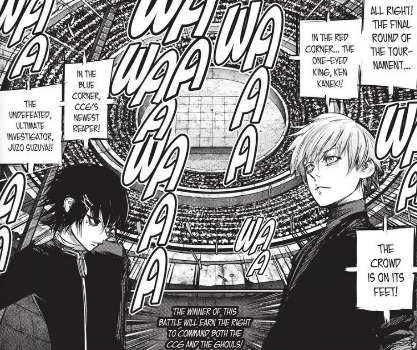
Gojo is a major character in the manga Jujutsu Kaisen, literally "Sorcery Fight" and he is the best sorcerer in the whole world. His entire identity revolves around being a sorcerer. Since he is so good and beloved at what he does, he thinks that everything is resolved by exorcising a curse or defeating a strong opponent. He has basically no identity outside of that. Which is why when he's fighting the possessed body of his student, a person he's been mentoring since childhood his priority is not to save Megumi but to beat a strong opponent. Gojo is a sorcerer, before a human being. That's who he is, that's who he always has been since day one.
I think part of the negative fan reaction comes from fans being really attached to this scene in the manga and deciding Gojo's entire character revolves around being a good mentor figure to children.

Which is just incorrect, Gojo's entire character revolves around being the strongest. On top of that though, Gojo can care about children and also care about being the strongest he can care about multiple things at once and have those things contradict each other because humans are complicated. I'd point out even in this panel where he's stating motivation he's not trying to raise these kids up into being healthy adults, he wants them to be strong Jujutsu Sorcerers. Even when he's raising kids, his intention is to turn them into Jujutsu Sorcerers because everything in Gojo's mind revolves around Jujutsu Sorcery. Gojo does not exist outside of the world of sorcerers. Gojo may be the chosen one but he'd never be able to hold down a job at Mcdonalds.
I think in general readers put more investment in the things characters say out loud, rather than their actions. You can say one thing and do another. I can say "I should never eat sweets again I'm going to improve my diet", and then go and eat ice cream five hours later. Gojo can state out loud his intention to foster children and protect their youths, but then fail to properly do that in the story. Characters are not always what they say they are, that's why they're interesting to interpret. This isn't me calling the readers stupid, just pointing out that Gojo is made up of contradictions. He wants to get rid of the old guard and replace them with something new, but Gojo IS THE OLD GUARD.
If the culling games arc has shown us one thing, it's that ancient sorcerers brought to the modern age do not care that much about human life on an individual level, they are all of them egoists. There's a reason Gojo resembles someone like Sukuna more than he does any other character in the manga. I'm not saying Gojo is exactly like Sukuna, he's far more altruistic and uses his genuinely noble ideals but at the same time Sukuna is a shadow archetype to Gojo he represents Gojo's flaws. The flaws that Gojo succumbs to in tragic fashion.
Which if you believe that Gojo genuinely does love his students, and the ideal he's fighting for is to raise up a better generation and allow them to live out their youths, then Gojo throughout the entire Sukuna fight is acting against those ideals. He cares far more about fighting Sukuna then he does saving Megumi, it's shown over and over again in the battle, Megumi is an afterthought to him. If Gojo care moredefeating the big bad and saving the world is more important than helping a child that Gojo is responsible for then Gojo is acting against his stated principles. Why should Gojo win the fight when he's fighting for all the wrong reasons?
Tragedies are like visual novels, if you make the wrong choice the novel will give you a red flag. If you ignore the red flag then you get locked into the route with the bad ending. Gojo always fights alone. Gojo only ever fights for himself, even if he's using that selfishness in support of a more noble ideal like creating a better generation of sorcerers. If Gojo consecutively makes the same changes then in a tragedy he's not going to be rewarded for it.
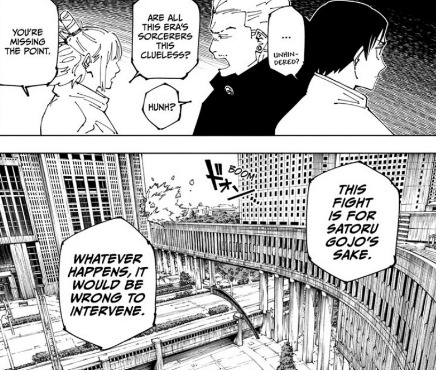
Gojo wants the old generation out and the new generation in, but Gojo resembles the old generation too much. Old sorcerers like Hajime and Sukuna respect him, Hajime argues that Gojo being able to fight for his pride is far more important than him living to the end of the battle when Yuta wanted to interfere and help him.
Gojo's death isn't a surprise curve ball that Gege is throwing us for shock value, it's a result of his choices throughout the manga. A manga about change, and the change between generations is not going to punish a character for remaining roughly the same. Of course you might find it disappointing that Gege didn't give Gojo the chance to grow and change and experience a character arc like Megumi or Yuji, but Jujutsu Kaisen is a tragedy, and the way Gojo's arc ended is consistent with what Gege wrote.

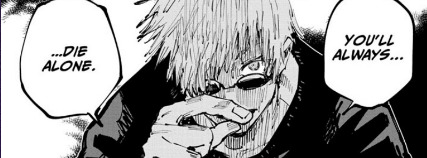
Jujutsu Kaisen is not just a tragedy though, it's a manga about death. The manga begins with Yuji's grandfather warning him not to die alone the way that he did. His grandfather's dying words are what motivate Yuji throughout the beginning of the manga as he's searching for a "proper" death.
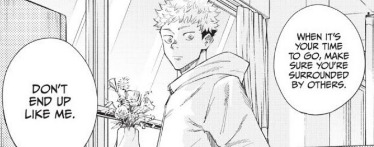
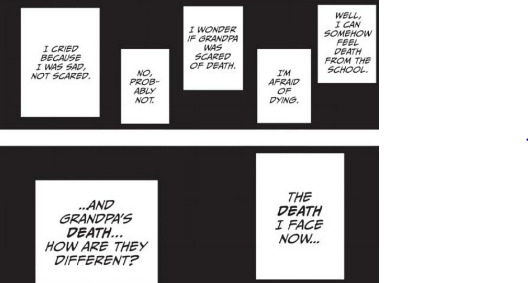

One of the major themes of Yuji's character is a contemplation of death. He accepts that death is inevitable, so he wants to save them from the gruesome deaths they'd experience if they became victims to curses and allow them to have a more satisfying death. Yuji's grandpa died an unsatisfying death because he died alone in a hospital room. Yuji even tries to make his own death a satisfying one because he believes by dying to seal away Sukuna he'll reduce the total number of casualties to curses.
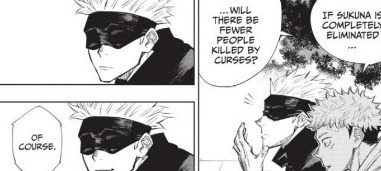
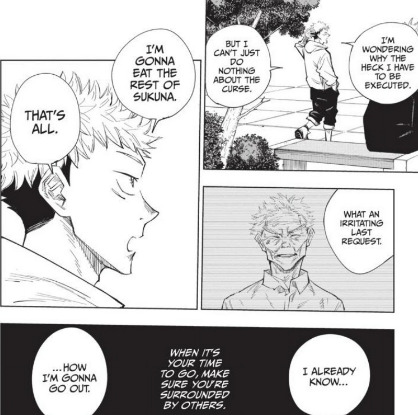
Jujutsu Kaisen keeps investigating the theme of death and what exactly would make for a satisfying death. At one point it's all but stated that death is the mirror that makes humans analyze their lives.
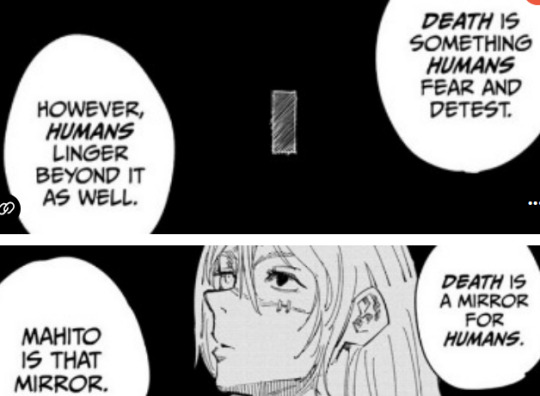
When Yuji fails to save Junpei from the "unnatural death" it calls into question whether or not his goal of saving people from unsatisfying deaths and the gruesome deaths caused by curses is even feasible. Nanami even says that Yuji might not be able to accomplish his goal and warns him away from the path.
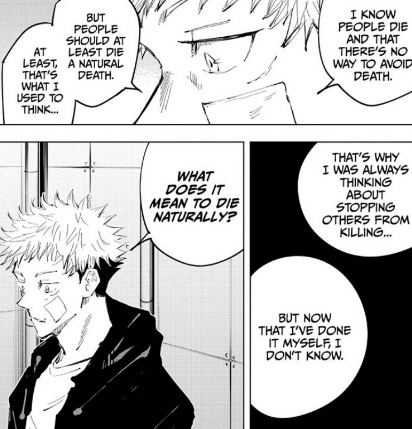
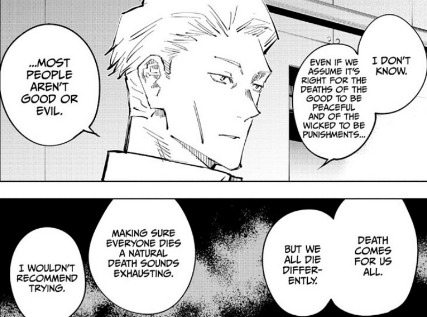
We see repeated unsatifying deaths in the manga, each time someone reflecting on their deaths that they weren't able to get what they wanted out of life. This list comes via @kaibutsushidousha by the way I'm quoting them.
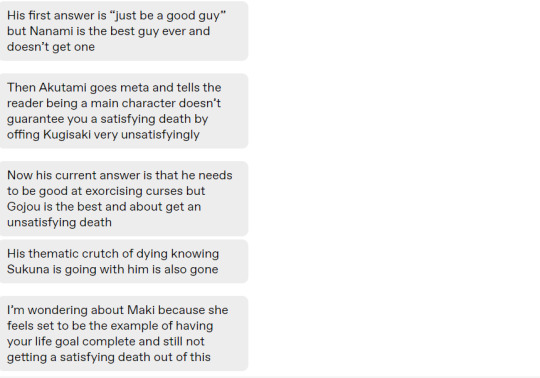
Nanami's a character who chose to work as a sorcerer because he didn't want to evade the responsibility of doing all you can to help people, he wanted to believe he's somewhere where he's needed. He never runs away from responsibility like Mei Mei does so he quite literally works himself to death, living and dying as a sorcerer. Nanami or Gojo's dying hallucination of Nanami even says as much, his death is the result of him choosing to go south and returning to be a sorcerer.
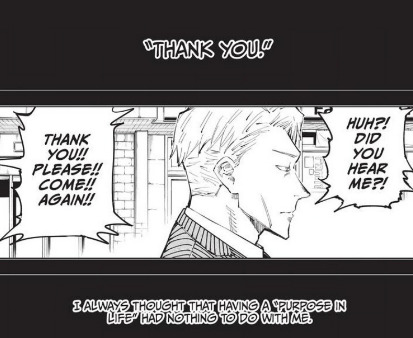
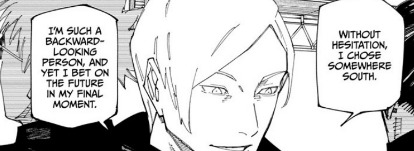
Maki chose revenge against the Zen'in over her sister, and as a result Mai is dead. Maki has all the power in the world now, her revenge complete but she's left with a sense of "now what?" She's as strong as Toji now but she failed to protect her sister, and it's the result of the choices she made. Maki's reflection isn't triumph, it's "I should have chosen to die with her."

Even Yuji himself is robbed of his narrative purpose. The manga began with Yuji saying he wants to choose how he's going to die and he'll die taking out Sukuna with him so he can reduce the number of people killed by curses in the world. Both of those things are thrown in Sukuna's face. Number one the amount of people Yuji can save by permanently killing Sukuna is now a moot point because he let Sukuna rampage in Shibuya.
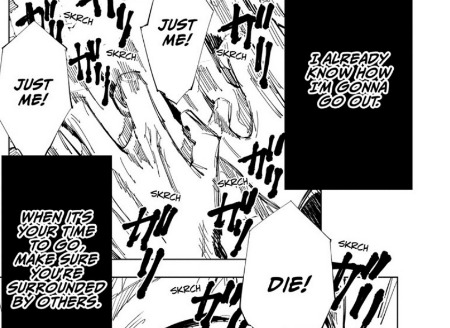
Number two, Sukuna isn't even in Yuji anymore. To build on what Comun said though, this repeated tragedy has a purpose to it and understanding requires understanding that Jujutsu Kaisen is an existentialist manga. Existentialism is basically a school of philosophy centered around the question of "Why do I exist?"
There's nothing about the invetability of death to make you question why you're alive in the first place. In the myth of Sispyhus, Albert Camus boils down all of philosophy to one question.
"There is but one truly serious philosophical problem, and that is suicide. Judging whether life is or is not worth living amounts to answering the fundamental question of philosophy. "
All of philosophy is should I shoot myself in the head or should I keep living? Everything comes after that question, which is why in Jujutsu Kaisen a lot of the characters motivations revolve around them contemplating death. Sorcerers exist in a world where they can die any moment, and as Gojo says most of them die alone. It might be the nature of sorcery itself that causes so many people to die, not only are they dying because they are trapped in an uncaring system, but the characters themselves aren't really attempting to live outside of it. They live and die as sorcerers, replaceable cogs in the machine.
All of these unsatisfying deaths may just be the result of all these characters making one choice, to live as sorcerers rather than people. Because to exist means to live in the world.
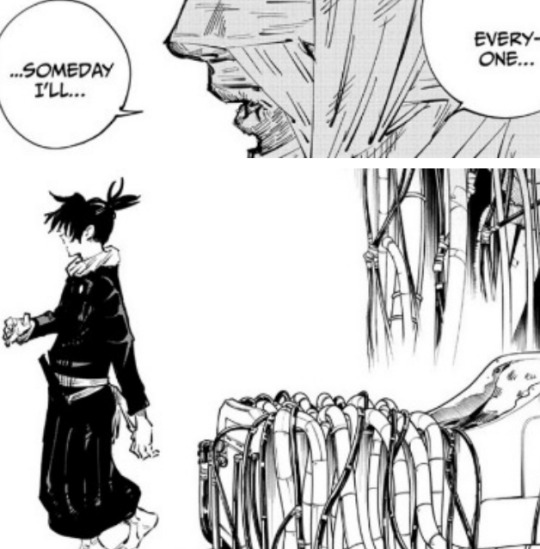

Even in Mechamaru's case, his goal is deeply existentialist by what I defined, all he wants to do is live in the world with everyone else rather than be stuck in his hospital room but his actions contradict that goal. Instead of letting his friends come and visit he's obsessed with the idea of getting a normal body because he feels that's the only way he can exist with everyone else, he makes a deal with the devil, he lies and goes behind their backs. He wasn't living with everyone else in the world and he could have chosen to, he chose wrong and his death is the result of that choice.

Jujutsu Sorcerers aren't living in the world. They're living in a little snowglobe far removed from the world with its own rules, most of them regressive and disconnected from the rest of society. If you define existentialism as just "living in the world' then a lot of these characters aren't, because they only exist in the world of sorcery.
INVISIBLE BUFFY: What are you talking ab-
SPIKE: The only reason you're here, is that you're not here. (drinking) INVISIBLE BUFFY: Right. Of course, as usual there's something wrong with Buffy. She came back all wrong. (moving around on the bed) You know, I didn't ask for this to happen to me.
SPIKE: Not too put off by it though, are you? (drinking) INVISIBLE BUFFY: No! Maybe because for the first time since ... I'm free. She tosses the sheet aside. Spike looks around, trying to figure out where she's going.
INVISIBLE BUFFY: Free of rules and reports ... free of this life.
SPIKE: Free of life? Got another name for that. Dead.
Not living in the world with everyone else is the same as being dead.
A lot of these characters either make the choice to act alone, or be a jujutsu sorcerer rather than a person and because of that they die as sorcerers, b/c sorcerers die that's what they do. Mai didn't want to keep living as a hindrance to Maki so she kills herself. Maki didn't want to be anything other than a sorcerer, so her little sister dies and she's not a big sister anymore. Nanami chose to leave his job behind and become a sorcerer again, he dies as one.
Of course I don't think the manga is punishing characters for being too egotistical, but rather too unbalanced. If anything Mai is too selfless and that is why she died, she didn't want to live for herself and chooses self sacrifice for her sister. An unbalance between selfishness or selflessness results in an underdeveloped ego. Jujutsu Kaisen doesn't punish individualism per se, moreso if you're not a fully developed individual you won't last long. Because it's also a manga about growing up in the world, and a person who doesn't have a healthy, mature, well-balanced sense of self is not a grown up.
This twitter user det_critics points out that Gojo (and also Yuki + Yuji's) failures in the manga can be attributed to the fact they don't have real senses of self.
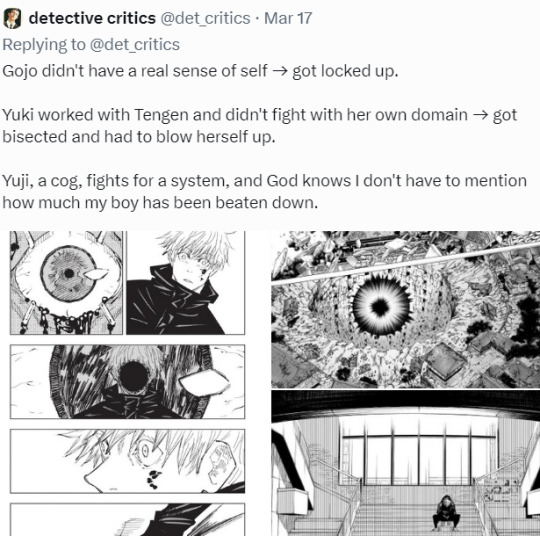
Gojo has an identity crisis as outlined by Geto, "are you Satoru Gojo because you're the strongest, or are you the strongest because you're Satoru Gojo?"
It's a challenge for him to find some reason to live outside of being the strongest, and in tragic fashion Gojo just doesn't find it in time. Gojo lived for fighting others, and proving to himself that he's the strongest, and that's how he dies.
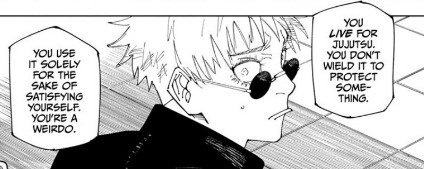
There's something I like to say about narrative punishment in stories. There are two ways to punish a character, you either don't give them what they want, or you give them exactly what they want. This is the latter, Gojo wanted to find someone stronger than him because deep down he believed that nobody could understand him unless they were on his level. He wanted to be surpassed, and that's why he focused on creating stronger young sorcerers, but he never shook himself of the belief that only someone as strong or even stronger than he was could ever be emotionally attached to him so he made a deliberate choice to draw a line between himself and others.
Gojo's essentially gotten what he wanted from that choice in the worst way possible. The student he picked to succeed him Megumi, has his body stolen and kills him. Gojo is surpassed, but it's not by one of his own students it's by an enemy that's not only trying to kill Gojo but is going to massacre his students afterwards.
Gojo's spent his entire life believing that because he's more powerful that makes him inherently different and above others, and being lonely because he himself believed he couldn't relate to ordinary people and he dies like an ordinary person, an unsatisfying death where he wasn't able to bring out Sukuna's best, where he gets unceremoniously cut in half offscreen but yay he's no longer the strongest. He's gotten exactly what he wanted. Megumi is still not saved, Sukuna's probably going to kill more people because Gojo failed to stop him here, but hey at least he stopped to compliment Gojo.
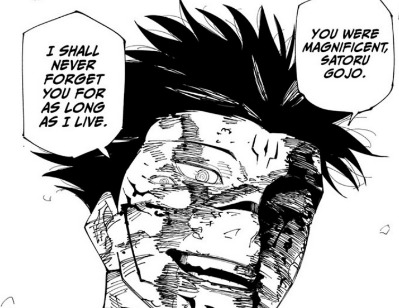
It's empty, but it's empty because of the choices Gojo made in life to just not bother connecting to people or develop any kind of identity besides being a sorcerer. Gojo lives and dies as a sorcerer, and his dying dream is returning to a teenager being surrounded by everyone he was with during his school days, because that's the happiest time in his life. Ironically he was happier before he became the strongest, because that was the only time in his life that he allowed himself to connect to people.
However in the eyes of others, he is someone who has it all. That's why he is always alone. There was no one who could hold the same sentiments and mutually understand him. Geto was the only one who could understand what he was trying to say, and the only one who could communicate well with him.
It's no coincidence Gojo and Geto die exactly a year apart on the same day, if anything I'd say the reasons they die are similiar to at least thematically. They both die because they don't want to live in the world. Geto thinks the world is too corrupt and GOjo doesn't want to be anything other than a sorcerer, both of them fail to adapt.
「 'It's just. . .'
It's just that it was what Geto had to do.
[...] To someone like him, the reality that the world of sorcerers presented to him was just too cruel.
'. . .that in a world like this, I couldn't truly be happy from the bottom of my heart.'」
They can't be happy in a world like this from the bottom of their hearts, so narratively they both die. The things they chose to live for at the end of their life they fail to accomplish, Gojo is no longer the stronget, Geto fails to wipe out mankind or make major changes to the world and they die as normal people unsatisfied because they weren't trying to live in the world and make connections to others. They die almost karmically a year apart because their main connection for both of them, the thing which made them feel connected to the world and other people was each other.
Which is why this panel breaks my heart and is so narratively satisfying because of how unsatisfying it is...
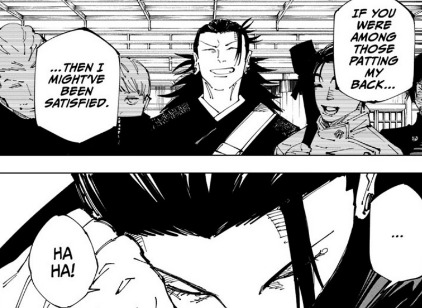
"If you were among those patting my back... then I might've been satisfied."
Gojo reflects that he's not satisfied dying against Sukuna, not because he failed to give him a good enough challenge but because Geto wasn't there to pat him on the back. The one thing that would have satisfied him he couldn't have, because he didn't live to connect to people he lived to be the strongest and he died alone as the strongest. There's just something deeply upsetting about Gojo's dying dream fantasy just him being there talking with all of his dead friends who he never appreciated or connected to properly when he was alive. Knowing that if something had just gone a little differently, that even if he had to die no matter what he could have died happier if Geto was among the people saying goodbye to him because that connection with Geto is what gave his life meaning.
Dazai Osamu: "A life with someone you can say good-bye to is a good life, especially when it hurts so much to say it to them. Am I wrong?"
-Bungou Stray Dogs Beast
#gojo satoru#jjk spoilers#jjk meta#jujutsu kaisen 236 spoilers#jjk 236#jujutsu kaisen 236#jjk 236 spoilers#jujutsu kaisen#jujustu kaisen meta#jujutsu kaisen theory#jujutsu kaisen manga#satoru gojo#geto suguru#suguru geto#satosugu
2K notes
·
View notes
Text
i’ve been watching One Punch Man, and i do appreciate that ONE makes sure to balance class differences (in terms of status, not money) pretty evenly. a lot of class-centric stories, especially in shonen, pick one of two extremes: make all the characters high-ranking individuals with low-ranking npcs as cannon fodder, or make all the lower-ranking MCs rise to the top while high-ranking characters sneer. The first one paints the high-ranking characters as the only people worth talking about; the second one makes the low-ranking characters seem like plucky underdogs who deserve their positions more than the high-ranking ones.
but One Punch Man has a point to make about hierarchies - namely, that people can be good and bad no matter where you are in the pecking order - and unlike a lot of other shonen works, he puts his money where his mouth is. sometimes you get selfless, heroic Class S heroes (Genos, Bang), and sometimes you get selfish, arrogant Class S heroes (Metal Knight, Tornado). sometimes you get altruistic, hard-working Class A heroes (Smileman, Lightning Max) and sometimes you get self-centered, opportunistic Class A heroes (Snek, Dark Gatling). sometimes you get Class C heroes who are willing to sacrifice themselves to save others (Muman Rider, Chain Toad), and sometimes you get Class C heroes who’d rather chase after recognition and fame at the expense of other heroes (the Tank Top brothers).
and in the middle of that you have Saitama. possibly the most powerful man alive, easily the most powerful man in the Hero Association, and yet he's ultimately just a c-grade hero trying to make his way up the ranks like everyone else. he does want to earn a higher rank, but only because it's a goal to pursue (and probably because he's lonely and conflates attention/notoriety with human connection, but that's a whole other post). and yet it's been shown multiple times that even in the face of an opportunity to raise his rank, when it comes down to it, Saitama will always pick helping others over being a hero. he'll lean into ugly rumors about being a lying cheater if it helps Class B heroes get the recognition they deserve. he'll save people who insult him (Suiryu), people who are taking advantage of him (King), people who obviously deserve whatever karmic punishment he's saving them from (the butt-chinned kid). he treats everyone equally, regardless of rank or wins/losses ratio, and judges them on their own merits - not by how powerful they are or how high their rank is, but by how well they treat him and others.
One Punch Man stands out because ONE is determined to go the extra mile in showing that status simply doesn't matter to real heroes. it's not a matter of what rank you are - it literally is just how you choose to conduct yourself. you get bad apples in every bracket, but you also get real gems who defy all the negativity that builds up between ranks and genuinely try to help. you can tell ONE really thought out his deconstruction and subsequent reconstruction of the class/status divide and power scaling issues that are so prevalent in shonen manga, and as per usual with his works, it makes for a thought provoking read.
#anyway. that's enough big words for one day#i just think it's neat how ONE always says “is anyone gonna thoughtfully critique that” and doesn't wait for an answer#i've never known an artist like him#one punch man#saitama#analysis#sage speaketh
187 notes
·
View notes
Text
option 1: tai’s guarding the crown of choice.
pros:
a legitimately important task that recontextualizes his ongoing decision to remain on patch as a personal sacrifice he makes for the greater good.
ozpin would pick the guy named for the god of light to be the gatekeeper of choice, huh.
if any parent in this story is meant to die, it’s him, and narratively this is the most intuitive way to do it.
cons:
realistically, what can tai do to prevent salem / cinder / summer from accessing the vault if they find it? if he’s the gatekeeper, staying on patch alone after everyone else evacuates achieves nothing except, ah, signaling to the enemy that the real vault is under signal academy. bad plan.
it means oz is breaking his promise to be honest and forthcoming, undermining his character growth for the sake of ‘surprising’ the audience with the most obvious answer.
means qrow has either been kept in the dark (see prev point) or he’s also deliberately hiding this information from his nieces after they asked him outright if he knew where tai is; this is so far afield for his character as to border on character assassination, and likewise undermines his positive growth since v7.
honestly makes both yang and ruby seem kind of stupid. they know the crown is hidden somewhere near beacon, that ozpin did something to protect it differently from the others, and that their father hasn’t left patch. ruby was sharp enough to guess that long memory might be a relic hidden in plain sight; yang is just as smart, and she knows tai had “some things” to look after on patch. are we expected to believe that “hey, is dad guarding the relic?” somehow hasn’t occurred to either of them?
tai harbors a whole lot of resentment toward ozpin, and based on qrow kicking him out of ruby’s bedroom to drip-feed her hints on where to go next, he seems to have been on the outer perimeter of the inner circle. why would oz entrust him with the relic’s safety?
glynda—ozpin’s scrupulously loyal second-in-command whose emblem is a crown and whose semblance puts her on par with a maiden—is a far more narratively plausible vault-guardian than tai, and the “sun dragon” makes a damn good red herring.
if he’s guarding the vault, he dies. sorry. but the point of putting the father of 2/4 protagonists in between the two main villains and the thing they want most (choice) is so they can kill him to get it, increasing tension and raising the emotional stakes of negotiating peace. to be clear, rwby is willing to Go There, but i think it’s an unsatisfactory way to close out the rose xiao long family arc.
option 2: survivors trapped under mountain glenn, and tai is taking point.
pros:
a genuinely important, worthwhile thing for him to be doing—even more so than guarding the crown. likely sets up a resolution for him in the vein of “you can be a good huntsman or a good father, and tai picked being a huntsman,” which is an elegant way to balance his contradictions.
gives him meaningful stuff to do in v10; for example, one stealthy huntsman with a bullhead could slip in and out of mountain glenn to get a few dozen people out at a time, and/or run supplies and messages between the kingdoms.
we get to see zwei back in action around mountain glenn :)
introduces a natural segue from playing defense in vacuo to mounting a counteroffensive against beacon as tai’s work clarifies the situation in vale.
easily the most 'heroic' direction for him without contorting the story to arbitrarily lionize tai: he’s a scout preparing the stage for the heroes to take the fight to salem, making him the good counterpart to watts.
cons:
makes no sense to keep it a secret. the emotional beats of B4 can still happen if the girls know this is what tai’s doing: instead of “do you… wonder why he’s not here? i know qrow said he’s on assignment, but what’s more important than here?” yang says “do you… wish he were here? with us? i know qrow said he’s looking for survivors, but how many of them can there really be by now? we need all the help we can get,” and ruby says “maybe we don’t have the full picture” as in maybe dad knows something we don’t and that’s why he hasn’t given up yet. the emotion is the same, and the big "they’re hiding in mountain glenn" reveal is hinted without spoiling.
leaves hanging the narrative thread of what tai has been doing since the fall of beacon, because the “some things” he was dealing with in v4 obviously wasn’t this.
option 3: tai is dead.
pros:
explains the apparent secrecy; qrow knows tai was away “on assignment” (i.e., had taken a huntsman contract that brought him out of the kingdom) at the time salem attacked vale, so he is missing but not yet presumed dead.
might reopen the mystery box of summer’s last mission through the real-deal “left on a mission and never came back” echo.
cons:
raven would know.
it’s a cheap, narratively unsatisfying twist that fails to deliver on the bread crumbs set up in v2-3 (tai starts going on missions again) and v4 (“some things”), and also undermines any serious emotional resolution with regard to yang and ruby’s complex relationships with tai.
option 4: summer’s working with salem, and tai is trying to convince her to come back.
pros:
“some things” being his presumed-dead wife who left him to join the enemy and with whom tai is now having an affair or otherwise hoping to coax back to the heroic side through the power of love whilst also keeping his mouth shut about her being a) still alive and b) a traitor is OBJECTIVELY the funniest answer.
brings forward and interrogates the way tai’s romantic grief informs the choices he makes as a parent: from hiding raven and then refusing to talk about her with yang, to shutting down when he lost summer and letting his five-year-old pick up the pieces, to discovering and then keeping summer’s secrets for the sake of some faint hope that she might finally come back to him.
cogent with the Dead (Absent) Mother / Neglectful Father / Evil Stepmother fairytale paradigm rwby deconstructs with raven, tai, and summer; the father chooses the stepmother over his children.
raises the emotional stakes of the war for summer through direct confrontation with the life she left behind, creating narrative opportunities to develop her character (is she still in love with tai? how does she feel about being his first priority, over their children? does she resent that he has her on this pedestal even now?) and apply pressure to her relationships with salem and cinder (do they know? is summer keeping her communication with him a secret, too? or is he an “asset” she’s using for salem’s benefit?).
consequently, raises the momentum of the narrative toward negotiation with salem; tai still has the coalition’s trust, however strained his personal relationships may be. summer is the obvious ambassador for salem’s side of the war, but she’s also the traitor who needs someone to vouch for her good intentions.
the secrecy needs no explanation: just as summer’s last mission was a summer secret, tai’s "assignment" is a taiyang secret and the girls know everything that oz and qrow do, because all of them have been left in the dark. raven might know, and she has the means to find if she doesn’t, but tai’s whereabouts are entangled with what raven knows about summer, so she can’t explain where tai is or why until she reveals her deep dark secrets about what happened between her and summer that night.
foreshadowing is solid: tai starts to go on "missions" again in v2, after the inner circle becomes aware that salem has infiltrated beacon and just before the breach downtown. when ruby visits summer’s grave in v3, she says "[dad] told me he’s going to be on some mission soon! i think he misses adventuring with you." he’s got to "look after some things" (but he isn’t talking about yang, because he stays home after she leaves). and then with B4 we have ruby echoing what the blacksmith taught her about summer in relation to tai, "maybe we don’t have the full picture?"
juicy
cons:
???
dependent on the unconfirmed theory that summer is working for salem as herself, not some unrecognizable enslaved monster, but i am as confident in that as i was about salem going to vale next and we all know how that turned out :)
taking their mom was not enough salem had to go for the full set APPARENTLY
option 5: secret fifth thing
pros:
???
cons:
???
86 notes
·
View notes
Text
The more I rewatch Fallout, the more I appreciate Norm as a character. Regarding what I consider to be the four main characters of Fallout and their narrative arcs, I feel like I've got a good idea of where most of them are going to end up based on the foundation they've laid:
The Ghoul is going to be dragged kicking and screaming into a redemption arc by his relationship to morally better characters. He will waffle between good and bad throughout the seasons as fits with his archetype and the writers' desire to keep him in that "dark, edgy" box as long as possible, but he started at such an extreme that there's only one way for his character to ultimately grow, back towards his humanity.
Lucy is going to be the hope she was raised to be. She will waffle between good and bad throughout the seasons as a result of the absolute torture she's going to be put through just for being a good person. But her place in the story is ultimately to be a heroic figure, the type of person who changes the world around her more than it can change her.
Maximus has two paths forward. He can reject the Brotherhood or accept it. He wants to be a good man but he needs safety, and those two are in conflict. He can be safe in a bad system or brave and break (or break free of) that system. He may waffle between good and bad throughout the seasons and that's going to make it even harder to figure out where he's ultimately going to end up. His arc is going to be that tug-of-war that ends when one side triumphs or he's pulled apart.
But then there's Norm.
I legitimately have no idea what's going to happen with Norm. I could see a version where he's a hero. I could see a version where he's a villain. I could see a version where he ends up somewhere in-between. He's a coward. He's reckless. He's part of the system. He sees beyond the system. He's loved. He's angry. He's surrounded by family. He's surrounded by liars. He doesn't care. He cares too much. He's very smart. He's too smart. Is he going to escape 31? Is he going to end up killing everyone in 31? Is he going to make a deal with the devil? Or is it his destiny to be the ultimate result of the "breeding program to create the perfect manager"? What does Norm want? What does Norm need? And what is he willing to give up? And what does he have left to lose?
72 notes
·
View notes
Text
Slay The Princess: The Damsel and Simplicity
SPOILER WARNING - This is my personal take on the Damsel. Enjoy. Or not.
i see a lot of people criticising or backhandedly complimenting the damsel's route because they looked very heavily into it, but in my opinion i think the fact that they looked so heavily into it is what caused these criticisms in the first place. and that's likely intentional.
the route is a lot less weird if you rescue her without asking questions and don't listen to the narrator, the only really weird bit being right at the end where her simple and joyful nature clashes harshly with the complicated nature of the story as a whole.
because the damsel's character, as a whole, is... simple. a dainty princess waiting to be rescued by her heroic knight in shining armour. if it wasn't for the shifting mound taking her at the end, this would have been a simple "hero saved princess and they lived happily ever after" tale.
however, if you ask her too many questions, that's when it gets weird. you ask her all these questions because you want more than what her character is and it feels weird that she really is as simple as she appears. continuously asking her what she wants causes her to deconstruct even when there's nothing left to see.
and if you kill her, the idealised fairytale takes a dark turn, but even as the grey, her motives are still simple. she's convinced that the cabin drives you to kill her, so she sets it ablaze, taking you with it so you can join her in death. all still with a simple smile on her face.
both of these more unnerving possibilities are the result of you being unsatisfied with her simplicity. and for a lot of people, that's understandable. but for those that embrace her simplicity, it's a heartwarming tale of rescuing a princess (up until the very end that is, which is fitting for the game as a whole, especially if this is your first path).
don't believe me? ask the shifting mound during the fight regarding the two different versions of the damsel vessel.
here's what she says about the deconstructed damsel:
"Love melted into skepticism, and you pulled back layer after layer after layer until all you were left with was the knowledge that you did not know me. You sought the truth then. Will you hide from it now that it is within your grasp?"
now here's what she says about the regular damsel:
"But the stakes meant nothing to you. You had a desire, and you set that desire free, you lifting me and me lifting you, forever and ever and ever. Consumed by true belief, there was nothing that could hold us back."
it can be that simple and heartwarming... if you want it to be. if you don't want that, you get a shell or a shadow of what it could have been.
the voice of the smitten reflects this as well. he is also a simple character. he is motivated by one thing and one thing alone: love. even when presented with the weird parts of the damsel should you choose to explore, he loves her in spite of that. warts and all.
and should you kill her and intentionally make the story dark, he has nothing left to live for and goes mad with grief, putting his simple desires under a dark light. (i will admit the burned grey was painful to go through because of this, seeing such a simple and optimistic character transform like that from sheer sorrow)
in a way, i would say that the damsel and the voice of the smitten are perfect for each other. a bit weird to everyone else, but to each other, nothing but pure and simple happiness.
and if you don't like that? of course you wouldn't like either of those characters. because you want more than that. most people want more than that. i'm personally fine either way.
but yeah, that's my take on the damsel (and by extension the voice of the smitten). a simple character. nothing more. will you embrace her simplicity, try to tear her down to the bone, or twist it into something horrifying?
either way, there are no wrong answers. and that's why i like this route. and this game.
#slay the princess#slay the princess spoilers#the damsel#i feel like a lot of people are going to hate me for this lmao#but fuck it might as well weed them out
170 notes
·
View notes
Note
So what direction do you think this togachako fight is going?
Ohhh I love where it seems to be going right now. This might be the most interested I've been in Toga's and Ochako's story ever.
First of all, we've finally got a clear picture of Toga as someone in need of saving. Her anxiety is so relatable it hurts. There are all sorts of things she could be thinking about, like how maybe she's not adequate to her friends because she can't be as helpful as Jin, or maybe her "love" isn't enough to save her friends, all that self-defeating jazz.
Which leads into what seems to be the crux of the matter: Toga's "love." I've noted in passing before that having her use the word "suki" to describe this love is very curious. It's just an adjective that means something is the object of your affection. It's not a specific word for love like the nouns "ai (love, but broadly)" or "koi (romantic love)" are. "Suki" is just as often translated as "like" as it is "love." So what does it mean that Toga can only use the quirks of those she feels "suki" for? Was it perhaps on purpose that Horikoshi used such a vague word for this feeling?
It seems like Toga has a problem identifying her feelings. By her own account, she "loves" Tomura and Dabi just as much, but she can't use their quirks for some reason. That means her "love" for them is different from her "love" for Ochako and Jin. And perhaps Ochako's character can provide the answer here.
Because Ochako has trouble putting words to her feelings for Izuku all the time. Other characters like Mina tell her it's love, but she doesn't seem comfortable accepting that. She also isn't comfortable with the feeling itself, so she pushes it out of the way when she doesn't want to deal with it.
As of now, I think the feeling--for both of them--is admiration.
For Ochako, it comes down to the events of the sports festival. She talks about how embarrassed she is for just following in Izuku's shadow and comments on how amazing Izuku is, how this tournament has really highlighted that for her. And she becomes inspired to grow on her own and meet him as a rival. In her match against Katsuki, her thoughts are focused on being like Izuku. "If Deku were here..." "Deku wouldn't give up..." "I'll win and be just like Deku!" Katsuki even mistook her battle strategy for one Izuku could have come up with. She wants to be like Izuku.
Sound familiar?
Toga wants to be like those she loves. Perhaps this isn't true with Tomura and Dabi. She doesn't want to destroy everything like Tomura; she wants to live with the ones she loves. She doesn't want to have vengeance against her family like Dabi; she wants the world to be easier for her to live in. She doesn't want what they have.
But she wants what Ochako and Izuku have: friends. She wants what Jin has: love. Jin loved his friends and devoted his life to helping them. She wants to be like that. We even see it with her first crush in middle school, a guy who looks like Izuku and is highlighted in her memory as fighting someone. Perhaps he was standing up for her, or standing up for anyone, and that's why she admired him. She wants to be a hero? She wants to be free to be herself...and maybe she wants that for the ones she loves too.
It's a sort of envy. Both of them have it. They want to be like the ones they admire. They're not comfortable with who they are. It's only when Ochako embraces the pieces of herself that she likes, the love of seeing others' happy faces, that she can push through her discomfort, cope with her jealousy, and accept herself for who she already is. Ochako learns more about Izuku than just the heroic image she starts out admiring; she professes atop the UA roof to everyone how Izuku isn't a special person, he was just given a special power. He's just like everyone else. He needs love and support as much as any other person. That's what prompts her to remember Toga's tears, and now we know that in that moment she wanted Toga to be smiling along with them too. It's when Ochako lets go of her envy and her idealized image of the heroic Izuku she blindly admired, when she accepts him as a person not above her but equal to her, that Ochako accepts herself and realizes she wants to save Toga. She's going to have to help Toga come to realize this about her own feelings--she has to help Toga learn to love herself for who she is.
And does any of that sound familiar? Blind admiration of a hero? Izuku's admiration of All Might perhaps? Izuku's blind admiration of Katsuki that contributed to the rift between them? How when Izuku accepted All Might and Katsuki for their flaws and saw them as people he managed to form better relationships with them? 👀
#anon ask#ask pika#my hero academia manga spoilers#final showdown spoilers#himiko toga#ochako uraraka#izuku midoriya#katsuki bakugou#all might#jin bubaigawara#linguistics fun#meta
354 notes
·
View notes
Note
Re: villain stans, I really do think you're conflating two groups of people and I feel the need to point it out because the art of haterism deserves pinpoint precision. The thing is that I would consider myself, broadly speaking, a villain stan and I also can't stand the people you're complaining about in that post because I think they've missed the point entirely. They've ruined the entire villain-loving ecosystem. I can't even facetiously say "they've never done anything wrong, ever, in their entire life" about characters that may as well be called Murders McWarCrimes, and whose death or comeuppance I am eagerly awaiting alongside everyone else in the fandom, because some of these idiots actually mean it when they say things like that -- and usually about some of the blandest, most disappointing villains I've seen in a long time. It's like passionately defending the storytelling equivalent of a slightly offensive shade of beige.
Look, some of us see the "time to boo and hiss" signs the narrative is putting up, but I'm not looking to experience every story like it's a children's pantomime. Maybe sometimes I want a wrestling match instead. I know the heel is going to lose. That's their job. It's what they're for. But if imagining that they might win is outside the realm of possibility... well, it's probably not a very good story. The stakes are not compelling. There's a reason that I would describe, say, c1 Briarwoods as delicious and c3 Delilah as overstaying her welcome. A good antagonist is a vital part of the story ecosystem and I enjoy seeing that role played well.
But I don't get to relish in characters being terrible people who do terrible things anymore, because now villain fandom is always overrun by people who read one Wikipedia article on moral relativism and want to have debates about what if Murder McWarCrimes is good actually? No! No, they are not! And if they were, that would be stupid and boring!
And so I reach across the metaphorical aisle to you that we may share in one of the hater's greatest delights: the knowledge that no one likes those idiots, and everyone wishes they would just shut up, even the people they think are on their side.
Hey anon,
I will admit usually when I get a long ask telling me I am conflating things I roll my eyes and wait for someone to say "i am feeling uncomfortable when we are not about me" but, the truth is, I very much was, and you are correct to the point that I think we are fully in agreement.
To be clear: I am pro people enjoying themselves in, as you say, the wrestling fan enjoying the heel way! I agree - a good story needs a villain who feels like a genuine threat. I can appreciate a villain for what they are and enjoy them very much as a character! I am personally unlikely in most cases to root for them but people who look at the story, analyze it, and say "this will be a fun guy to care about, even though I know the victory's probably going to the heroes, and I will be normal and not terribly resentful" are entirely valid and my post is not about them (except to say carry on as you were). It sounds like you're in this latter category and so: carry on as you were, you guys are great.
But I am definitely conflating two flavors of annoying villain stan:
the first is, as you very eloquently put it, the Person Who Read One Wikipedia Article About Moral Relativism and ooooooh what if Mr. Murder McWarcrimes was sufficiently sad about bad things in his life such that the murder and war crimes are correct actually.
The second is the person who does understand that they are looking at a villain who is a bad person but seems actively confused that like, a largely hopeful or heroic narrative will probably not end with Mr. Murder McWarcrimes stabbing everyone to death and then evil laughing against a red lightning-filled sky and seems mad that people are like "actually I like Kit the Heroic Hero". Actual Play D&D is not a place where you'll find these people because a TPK is technically possible regardless of the existing themes! But like...for example, I have to imagine theatergoers in 1983 who weren't idiots did not walk into Return of the Jedi like "oh man I think Darth Vader's gonna win the whole thing and he'll blow up everyone and institute more Space Fascism over the nuked out husk of Endor." Like, as you say, the villain needs to have some bite to be worth my time, but deep in my heart, there are stories where I know that victory is assured by the nature of the plot and it's much more about how it will be assured and what sacrifices will be made, and so it's weird when someone seems to be existing in a denial that that's the story and is like NO Mr. Murder McWarCrimes is NOT going to get a comeuppance and everyone is going to DIE at his hand.
#answered#Anonymous#anyway ty anon#i did have to kill one of my darlings (dunking again on otohan's lack of personality) in my response here but. needs must
35 notes
·
View notes
Text
Part of what I love about Wyll is how he feels like a character you have to keep pulling back the layers on. Like one of those 3d puzzles you think you’ve got figured out and then you realize you’re right back where you started. Which I guess is just the long way of saying he's a well made character. I’m gonna do a play by play of my first interactions with him to illustrate my point:
When you first meet him you’re like omfg who is this boy with the dramatic theater kid entrance lmao. Wyll, you are so dorky (affectionate).
You next see him helping tiefling kids learn to fight. Not in a harsh militaristic way, more in a gentle and even playful way (eg. When you play as Wyll you can tell them dramatic stories about how Wyll slayed a dragon.) You're like oh yeah this guy has the whole hero thing going on. Very disney prince over here.
Then you talk to him and he talks about an evil devil that must be killed with such adamance and determination. You're like oh wow he can get pretty intense. He's so determined about this, he's willing to put aside the pressing threat of ceremorphosis. This kind of unmoving moral stance, this very good and serious abt it thing, it gives off paladin vibes imo
Ok so thats two sides of him, dramatic storybook hero and strong willed paladin.
Then you get to the confrontation with Karlach, and pretty quickly realize this flaming hot cheeto (idk why I called her that ok, but im leaving it in) of a tiefling shouldn't be killed. Wyll takes some convincing and you're like Wyll you dumbass you're seeing what Im seeing right? The tadpole is showing us she's innocent, why dont you believe that?
Then its only till later you realize he had so many good reasons to hesitate:
He has been doing this job for 7 years now, to break off from the script he's used to, is a risky thing. If he cant trust his 7 years of experience he's left floundering. If he cant trust that he's been only killing evil, then he's broken his moral code too. (If I were in his shoes id for sure be having an existential crisis)
He's learned the hard way to distrust devils, what if Karlach is tricking everyone into thinking she's innocent?
Or maybe he's scared of what it will mean if he doesn't kill her, he'll be breaking his pact, and the consequences for that will most definitely be harsh. I don't think that's selfish or cruel of him to consider killing her out of fear of what will happen if he doesn't. I think Wyll would be unfair to himself for those thoughts tho. Like the whole airplane oxygen mask analogy is a good way to talk about it. Wyll would go to every passenger on the plane and make sure their masks are on, then collapse from oxygen deprivation because he never put his own on. Perhaps an extreme and unrealistic scenario, but illustrative of his admirable but harmful self sacrifice.
In summary, his hesitation and need to be convinced shows a lovely amalgamation of his character, his life experience, and his values, and how it results in a moment of conflict and indecision.
But it takes very little to convince him not to kill karlach. You tell him twice that Karlach is no threat/innocent, and he stops panicking, and pulls himself together with the kind of emotional control/repression that makes you go "uh oh babes has unresolved trauma and needs therapy"
His ability to listen to others when people tell him he's wrong shows that he has a flexibility and emotional maturity that is unlike the stereotypical paladin. Once he realizes Karlach is innocent, the rules he follows no longer matter to him.
He resigns himself to his fate because for him there is no other way for it to be. This shows that no matter how theatrical his heroics appear, it is not merely a guise. You can trust that he truly cares for people because he is willing to sacrifice himself for the sake of a stranger.
Then Mizora shows up and his response is to argue against her, to say, "you told me no innocents". Which shows once again where his priorities lie, now that injustice has been pointed out to him he will use every ounce of his will to fight it. It also shows that human weakness again too. His fallibility (I mean who can blame him devils are great manipulators) and his worried questioning of the rules that he has followed for so long.
And then when you put all the drama aside, and listen to his lighthearted dialogue you remember/realize he’s also very goofy and the kind of chill guy you’d want to invite to every friend hangout.
asfgjkl; anyway I have way too many thoughts and feelings abt this guy. If you read all this damn. But lmk what you guys think about my reflections!
Also shoutout to all of the fic writers and random fan posts ive read that have inspired some of these thoughts
29 notes
·
View notes
Text
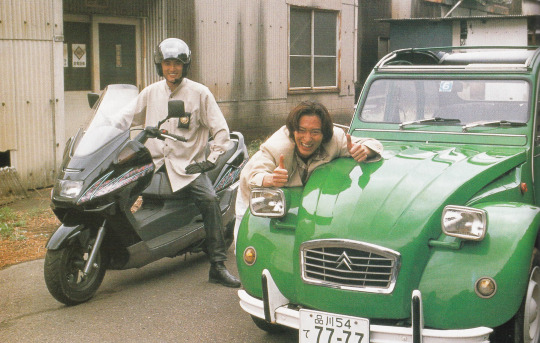

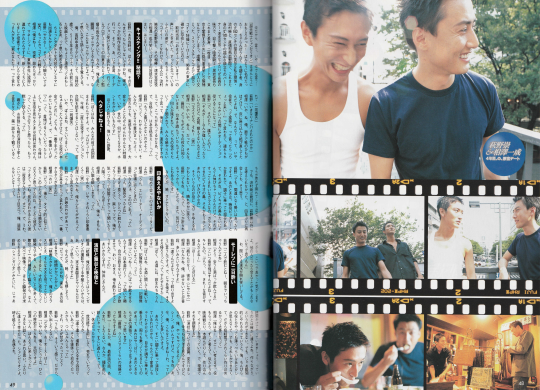
Hero Vision Vol.1 (2000/Winter)
Changerion Reunion Interviews
ft. Takashi Hagino & Aizawa Kazunari
(translations below)
Publication: December 31, 2000
Takashi Hagino & Aizawa Kazunari: After 4 years, a date in Harajuku
Hey you two, how are you doing these days? It's been 4 years since the end of the broadcast. You two had a fateful encounter in "Choukou Senshi Changerion," an unusual heroic show that still remains popular to this day. We asked Takashi Hagino and Kazunari Aizawa, who say they still get along well with each other, about their memories of those days, and what their future plans are.
Main Interview Section
"I'm going to say it now. I mean it, I'm really going to say it right now! Changerion was really entertaining! It was truly a masterpiece! Suzumura Akira, a happy go lucky, good natured, 182cm tall, cat eyed, beautiful private investigator, and his partner, Hayami Katsuhiko, a 183cm tall, hot blooded and direct individual with a handsome face, are both on the side of justice. Kuroiwa Shogo, the Dark Knight, is an elite who's handsome, also quite tall I guess, and is running for governor of Tokyo in order to seize control of the city. A slapstick comedy and super cool tokusatsu hero show, with a mixture of fiction and reality, something like this most definitely existed in 1996 Tokyo. On the day of this interview, I was so excited to hear their voices saying, "Good morning~!" The appearance of those two standing there looked really really cool! And so begins the converstions full of laughter between Takashi Hagino, who plays the main character Suzumura Akira, and Aizawa Kazunari, who plays his partner Hayami Katsuhiko."
-Casting!! Secret Stories?-
Hagino: At that time, the role was the same as it always was, wasn't it? I went to a party at some production company, and someone was like, "Ah, you there," and told to come in for an audition. When I went to it, Shirakura-san, the producer, and Nagaishi-san, the main director, were smiling ear to ear once they saw me. I remember thinking, "What, why are you smiling like that?" I was 22 at the time of my debut, so it was about 5-6 years after I dropped out of high school. Before that, the movies that came out around that time made me think that acting was really interesting.
"You've also appeared in a V-Cinema that contains slightly adult content."
Hagino: It's bad. Please don't watch it (laughs). Watch something else where I look cool.
Kazunari: For me, I had just started acting, and my manager took me to Toei's head office to introduce myself. I announced that I was new and would be in their care, and then a strange old man came up to me and said, "Are you the one?" (everyone laughs).
Hagino: Wait! Was he trying to flirt with you?!
Kazunari: Uh, no, you see, my shoelaces became untied in the hallway, so I had to sit on the floor to retie them. He came up to me and said, "What's wrong?" I said, "Ah, no, I'm an actor," and he said, "Come with me then!" Things got carried away, and before I knew it, I went in for an audition.
Hagino: So, who was that guy?
Kazunari: He was……a really good guy to say the least, I actually don't remember his name.
Hagino: You're terrible! (laughs).
Kazunari: No, no. Look, it's because, it's just…anyway, so, at first, I was reading the script without knowing which one of us would play the role. Then, when it was down to just a few people, they asked me, "Which role do you want to play?" I was like, "Well, Hayami, I guess." I wondered if this was it, and then I passed, I passed……huh.
Hagino: Can we get some more joy here?
Kazunari: Well, it's because I really didn't understand. I didn't really feel it when I was suddenly told that I got the job. What's more, I still had no idea how hard it was going to be. No, rather, you really don't know what's going to happen in this world.
"Thank goodness for untied shoelaces and nice people"
-I'm not awkward!-
Hagino: I was asked to read my lines in front of everyone. Naturally, the producer told me that in the future, he would never have me read my lines at the audition for a leading role ever again (everyone laughs). No, I thought it went really well, and while I was a favorite to play this role, somehow I was also the worst. One of the more important people there looked as if he was going "?" all while tilting his head. He looked really nervous. He said, "From now on, when we present leading role auditions to the higherups, we won't make them read lines." He also said, "If you go with this guy, then shut him up and pick him already."
"It's true, Akira's acting wasn't very good, and I felt so embarrassed watching that I wasn't even able to finish the first episode. But, I could never think of anyone else playing Suzumura Akira but Takashi Hagino, and I still think that way after seeing him again after four years."
Hagino: But, back then, I definitely had some momentum. I was always told "You're a perfect fit for the role of Akira!," and a part of me got carried away over it, it felt like my nose was growing just like Pinocchio, except this nose is of brilliant glass. If Pinocchio's nose was made of glass, it would be really beautiful and sparkling.
"He smiles cheerfully and says that such things give him "the power" to play a role."
Hagino: But, you know, it's going to break someday. When that happens, only then will you understand.
"Afterall, Akira, aren't you suppost to be an adult?"
-First Impressions-
Hagino: We first met in an elevator, right?
Kazunari: Yeah, it was in an elevator. When I was on my way to the audition area.
Hagino: I said, "Huh? What's with the long hair?"
Kazunari: Yeah, it was really long.
Hagino: Incredibly long, it was tied in a single knot, along with wearing black jeans and a black shirt. I noticed him and asked, "What floor?" He said, "8th floor, hurry it up."
Kazunari: You liar! No, I politely said, "I'm going to the 8th floor, please."
Hagino: Well, I don't know, I guess that's just how bad my impression of you was (laughs).
Kazunari: Somehow, I never thought that the two of us would be working together.
Hagino: Yeah, I had costume fitting, and they told me that my partner was coming, and then the absolute worst guy came walking in.
Kazunari: Hey now (laughs).
Hagino: Because we seemed so similar in type, I thought there was no way the two of us would be together. Then he came in. And, as you can see, he's handsome, incredibly so. And…uwah. He stands out just by standing still. I really have to do my best here. Even still, I feel good with this guy. I can't imagine anyone else, as I'm already spoiled being stuck with him.
"Oh? Hayami is smiling shyly as he listens."
-Dramatic Drunks-
Hagino: When we drink together, we end up staying up until morning, right?
Kazunari: Yeah, when I see him, all he does is drink.
Hagino: When drunk, this guy tries jumping backwards. He gets really mad. When he stomps, it makes a nice sound.
Kazunari: I see… (pretending not to know)
Hagino: I end up joining him (grinning)
Kazunari: It seems I do alot of unacceptable things.
Hagino: Not really. He says that like I'm trying to wring it out of him. Well, guess I'll just go home then… (walks straight past him)
Kazunari: I do drink abit too much.
Hagino: I feel like a fighter when it comes to alcohol. I'm trying not to lose my memory here.
Kazunari: This guy makes people drink all the time. He'll ask, "Want some sake?" It seems I don't drink for myself, rather, I only drink due to the influence of other people. (to Hagino) Hey, you, you're the reason I always end up getting drunk.
"As usual, they are the best of friends."
-Acting, Theatre and Films-
Kazunari: Basically, about halfway through Changerion's filming, my impression of him was, "Ah, this guy, he's actually really serious.
"Oh? Somehow, Akira looks very happy."
Hagino: That's because, you know, it took me a long time to properly get into the role.
Kazunari: In our current ranks, we don't get into such big roles on TV or movies. I often get a role at the last minute, and have to act on the spot, so I think that because I can practice for a month on stage, movies really require alot of power in comparison.
Hagino: It's definitely different from Changerion, where we could say, "Let's take our time and work on it." I won't be able to make it if I try to wing it. But, if you ask me if I can act in the moment, I can't play the role of a big shot, because I think it wouldn't come off as authentic, but it'll be the best I can do, so it's important to know how much you can work with in such a short period of time.
Kazunari: I think about it alot. When I get a role, I'll think about it for a long time, doing research by watching similar movies, reading books, and so on, then, build up an image. Finally, once on set, adjust it as I see fit.
Hagino: My perception of acting has changed. I'll still watch the videos, and think, "Wow, I really did it~." But, there are also scenes where I'll say, "Oh, I don't think I can do this now." There are so many scenes like that. Although, it's a great opportunity to get into the swing of things, because you end up transforming yourself. The more I got into the rhythm, my surroundings were also in rhythm, so I was able to stay on track. Changerion was a a unique experience, and I don't think I could have done it alone.
Kazunari: The final broadcast was on Christmas, right?
Hagino: For some reason, I don't want to talk about the final episode. It went something like, I drank alot before the shoot and just had alot of fun, since we basically had a day off…
"Does this mean you were having a rough time before the end of the broadcast?"
Hagino: No, no, that's not it. We had about four days off before we started shooting, and I'd never had such a holiday weekend before, so I got alittle too relaxed.
"Does that mean things ended on good terms?"
Hagino: Yeah ❤️, that's how it felt. That's why I don't want to remember.
Kazunari: Like-I-was-say-ing, you…
Hagino: No, no! For me it may be just a past memory, but it's an important one.
Kazunari: Yeah, it was alot of fun.
"Never ending stories and overflowing emotions. I was happy to meet them. Changerion, beyond time…and for all eternity."
#one of my favorites#changerion#choukou senshi changerion#suzumura akira#akira suzumura#katsuhiko hayami#hayami katsuhiko#my scans#my translation#hero vision#takashi hagino#hagino takashi#kazunari aizawa#aizawa kazunari#tokusatsu#toku cast#takeshi asakura#asakura takeshi#kamen rider ryuki#interview#I only read this around christmas#this whole thing is just an episode#it's only been 4 years...
57 notes
·
View notes
Text
The Good and the Bad Ending.
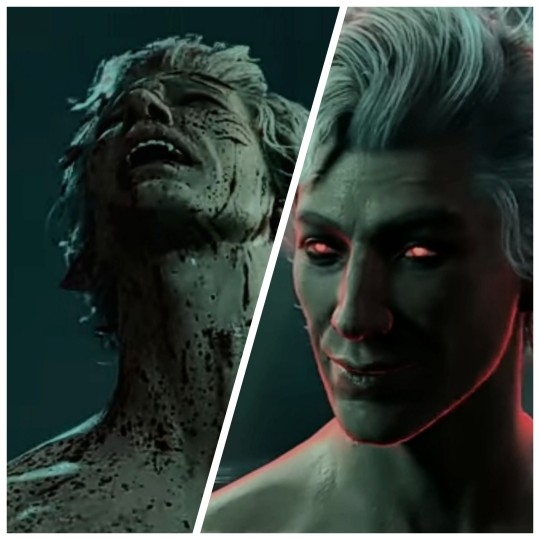
This is a purely analytical look at Astarion's story, considering both endings.
I am drawing on my knowledge, which I gained through studying creative writing and years of passion for stories and characters. I will not be making any judgments about whether ending is "right" or "wrong." Each individual can decide for themselves which one they prefer. (Forgive errors in the text, English is not my native language)
At first, I will explain to you some tools to plan or analyze a story. A schema that can be used to orient yourself to roughly plan a story. To prevent having just a narrative of events, but to use exciting plot points to turn a narrative into a story.
The most famous is the three-act structure. Sound familiar? The three acts in Baldur's Gate.
Very roughly: Beginning - Middle - End.
The impetus - the emotional climax - the test of strength.
Then there is the five-act structure and some triangles. Everyone can use their favorite there. I orient myself on the so-called hero's journey, it uses between 12 and 17 points. The individual sections can be interpreted creatively and weighted individually.
With "hero" here, no knight or superhero is meant. He doesn't even have to perform heroic deeds. A hero is here referred to as the protagonist, i.e. the figure that it's about. The journey is, well, the journey. Of course not from London to Thailand, but the events that shape the figure on her way.
Astarion's Story Based on the Hero's Journey
1. Everyday life
We learn about the ordinary life of the hero. It doesn't have to be shown exactly how he lives, like in Harry Potter. It can also be mentioned in the course of the first events, as long as it happens in the first act. And in the ordinary world, there is a problem, from which the goal of the protagonist emerges. Every story needs a goal. Without a goal, no journey.
We learn that Astarion's daily life consists of luring victims for Cazador, mostly on a sexual basis. Torture, hunger, fear, and the complete abandonment of his personality form the problem. The goal is therefore freedom from his master Cazador.
2. Call to Adventure
The hero is usually thrown into an event that represents a significant change in everyday life and challenges him to address his problem.
Astarion is kidnapped by the Nautiloid and given a tedpole what makes possible for him to live a life of freedom now. (walking in The sun... You know) He does not have to fear his master anymore.
The hero usually resists the adventure first, but there comes a point where he finally decides. (Like in the Matrix: the red or the blue pill? )

From Astarion's origin, we know that he dreams of Cazador, who reminds him of his rules. Astarion decides to break one of these rules and bites Tav. After the bite he feels stronger because he has drunk the blood of a thinking creature for the first time, something his master forbade to keep them weak. he now feels ready to take on the adventure.
The next 3 points relate to:
3.4.5. Building Up the Conflict
We usually meet a mentor here who enables the hero to embark on his journey, who supports him and gives him advice. For Tav, it is The Guardian, but we are looking at Astarion's journey, and there is definitely Tav, the companion who supports him and guides him in dialogues (which one to support decides the player)
We learn about a so-called gatekeeper. Something or someone that makes his journey difficult, which is either identical to the mentor or to the antagonist.
This could be the scars on Astarion's back, which symbolize the influence of Cazador. Something seems to be still in his way, but what do they mean?
6. Crossing the Threshold
Symbolically, as well as actually, the hero enters unknown territory. The shadow curse.
Symbolically, Astarion begins to question things and explore unknown territory. He touches the scars because he now wants to know what is written there, as he feels that it has relevance.
he even seeks the help of a devil to find out more about the scars. Astarion is so afraid of being Cazador's slave again that he would rather give his soul to the devil, he says.
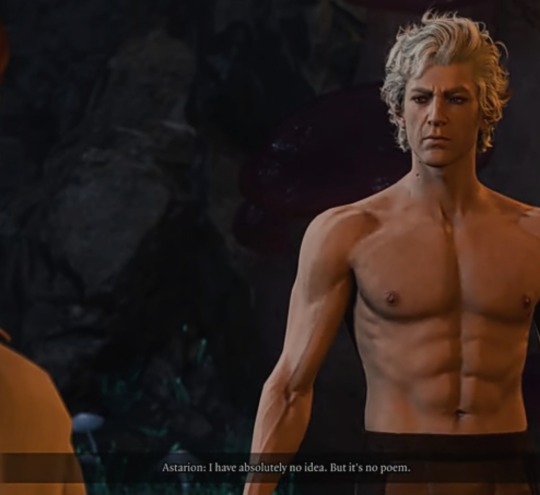
He is concerned with maintaining his freedom and how he could defeat Cazador. A thought that seemed impossible before.
He wonders how he can become even more powerful with the help of the tedpole, so as never to get into this situation again?
In Astarion's worldview, the powerful are the ones who oppress others. This means for him that in order to never be oppressed again, he must be mean to others. So he is manipulativ and selfish. This worldview is reflected in his approvals.
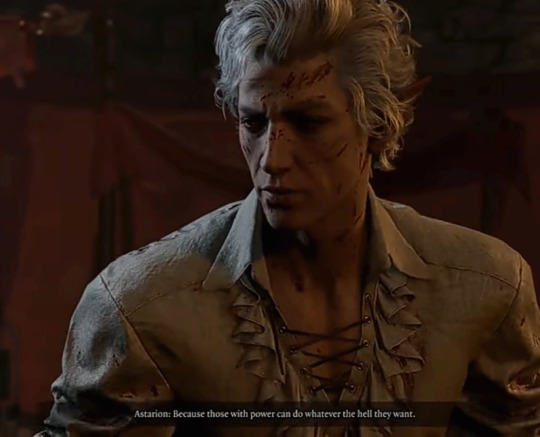
Now, when he is essentially already free, he also begins to question himself. An example of this is the mirror scene. What was his eye color like before? How does the world see him? How does Tav see him? Who is he behind the vampirism?
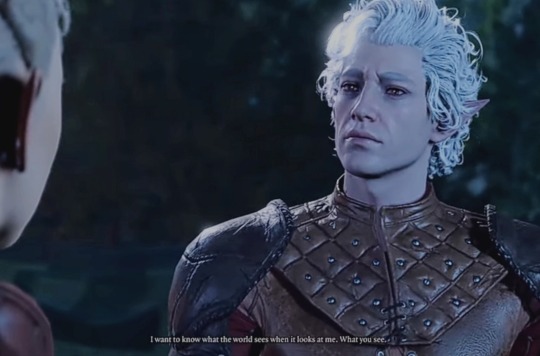
7. Road of Trials
The hero learns what rules and laws he still needs to learn in order to face his ordeal (Cazador). Here, the so-called ('fall height') the drop high, is usually represented. So how much could the hero lose if he fails?
This is where the meaning of the scars becomes important. In this case, his death and not only that. After this ritual, his soul goes to Mephistopheles.
8. Death and Rebirth
The hero dies a symbolic death and after this event he is changed. In Shadowheart, it is clearly the moment when she faces Nightsong. For La'zel, it is questioning her queen. After that, they have a different view of things. They are changed, Shadowheart even physically. This change is called initiation (more on that later)
It doesn't always have to be a fight, it can also be the death of a friend, or the hero learns about his true origins.
characteristic is that the hero is changed.
In order to get an answer to the meaning of his scars, he is supposed to kill the Orthon for Raphael.
9. Initiation
The moment of the symbolic death of the old and the birth of a new, more mature identity is called initiation.
For me, this is clearly the confession scene. In my opinion, it is the most important scene. The turning point of his character. It definitely takes place after the fight with the Orthon and as soon as you reach the Moonrise Towers.
Here we see the real Astarion, who has taken off his mask. He is honest and sincere and accepts the consequences consciously, since he really regrets his behavior towards Tav. Not manipulativ or selfish anymore.
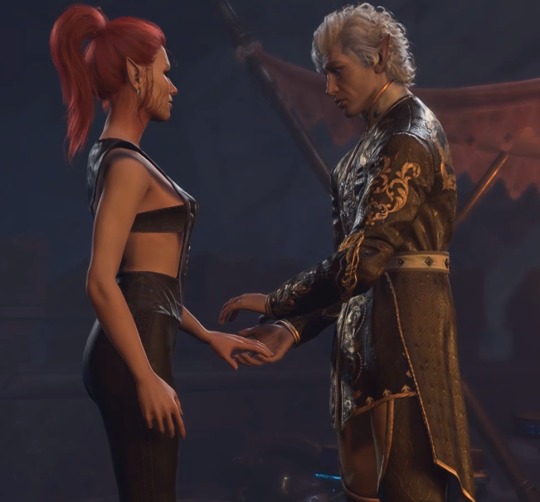
This scene is also triggered after the dialogue with Araj Oblodra. After he clearly states that he will not bite her. But what exactly happens there?
He was able to decide for himself for the first time in 200 years, to resist, without having to fear anything. He realized that he was already free in his choice of actions, but still stuck in old patterns. He questions himself. Who is he if he is no longer Cazador's slave?

He is now honest and confesses to Tav about his manipulation and his sexual trauma. (Which is a moment of weakness and Astarion generally does not like to show weakness.) He begins to take responsibility for his actions, the character begins to change.
10. The Gift
For the previously aroused courage, the hero receives a reward. A gift. This can be a skill, a weapon, knowledge or an insight.
For killing the Orthon, he now gains the insight into the meaning of the scars and learns a way to become the Magnificat bastard of Fearun himself.
With his honesty and confession, he has won Tav over to his cause. He has shown Tav his true self and Tav will (at best) fight for him without having to give up his body as usual. So the friendship/romance with Tav is a gift too.
11. The Escape
The hero has to return to everyday life because the forces of evil are still active. Here the hero meets old ghosts and meets them with his changed self.
In the catacombs of the palace of Szarr, Astarion learns that all his victims of the past 200 years were hidden there to be sacrificed for the ritual. Especially the encounter with Sebastian seems to trigger something in him and mirrors the relationship to Tav, where he was able to allow feelings. Here Astarion seems torn, he jumps from absolute disinterest to sincere remorse. Which is a sign of mental instability. Astarion shows many symptoms of ptsd, but that is material for another analysis.
12. Final Ordeal 1
The most difficult part of the journey now lies in the final ordeal. Here the hero applies his new insights and gifts. He knows about the ritual and how he could stop it or use it for himself. He has found enough self-confidence to attack Cazador, but of course it is not that easy. Alone, his soul would be in hell within a few seconds. The fight begins and now his previous achievements pay off and Tav helps him.
13. Final Ordeal 2
The hero believes he has accomplished the task, but he realizes that he still has a task ahead of him.
(Ascension or Not?) Because the forces of evil are still active and he has to fight for the gift again.

Now he sees the power and is faced with a decision.
We remember, everything he does, he does out of fear. He would even give his soul to the devil, but is that still necessary when Cazador is dead?
And here Tav comes into play. the mentor who helps him make the right decision based on previous dialogues and actions.
-You decide, based on your Playthrough-
Important: The best stories always make the hero pay a price to achieve his goal. Otherwise, it seems too easy and the reader is not emotionally drawn in.
So what price does Astarion pay?
The Bad Ending
It is called bad, as it continues the cycle of evil. Astarion sacrifices 7,000 souls to satisfy his need. He continues what his master started. The villain has only changed his face.
If Tav doesn't make him feel like he's enough (the level of approval) that he don't need that infernal contract his Master started. Then he doesn't feel safe enough to stop the ritual.
After the ritual, he is free from the flaws he had as a vampire
The Price
His soul? Maybe. Cazador says that all who wear this rune are bound to the ritual and will be consumend.

This ritual has its rules, something has been changed, the one who performs it, but does it change the rules?
Even if not, this ritual is infernal, and it is often mentioned in the game that a pact with the devil always comes with a price. Wyll says that the devil doesn't just take something, he takes everything.
The ritual overrides the process of self-discovery and the mask of madness that grew out of the trauma has manifested itself.
'Your hunger veers towards madness' is what it says in the Origin. And this madness is immediately noticeable. He goes back to his old patterns. His striving for power, as we know, a sign of fear, and seems consolidated. He doesn't talk about anything other than ruling over everyone. He is performing again, especially in the romance that becomes visible when he asks you how you would like it. He is obsessed with you, which is a sign of fear of loss. He remains a slave to his trauma.
The Good Ending
It is 'good' because the hero defeats evil, interrupts the ritual, and frees 7,000 spawns.

Astarion understands that he can break the cycle of evil, who he was being a victim himself and giving up the power so he will not sacrifice others to satisfy his needs.
We remember the confession scene. The character has changed and is sticking to it. He is sincere and accepts the consequences consciously, since he truly regrets his past (for example what he do to Sebastian)
Astarion has no longer to perform in front of anyone and can therefore deal openly with his trauma. In the Romance scene he processes what happened to him and is now ready to face his own future.
The Price
He gives up his wish to regain the comforts of a living being to not sacrifice 7,000 innocent people he lured. He cannot have the comforts of a living being again. He is once again a slave to his hunger and the shadows. He gives up the ability to walk in the sun, as soon as the tadpole disappears.
Conclusion:
Let's look again at the goal and whether it was achieved.
In both endings, he is free from Cazador.
So the hero has achieved his goal, both endings are meaningful for Astarion.
One is morally right, the other morally wrong. It is up to the player to decide which one is better.
Can power help to deal with a trauma if you continues the cycle of evil u lived in?
Do you have to live with the disadvantages that someone else has given you?
Astarion himself approves to be persuaded not to ascend. +3
#creative writing#baldurs gate 3#astarion#astarion bg3#baldur’s gate 3#dnd character#story analysis#charakter analysis#bg3#ascended astarion#spawn astarion
68 notes
·
View notes
Note
I have to admit i had that massive urge to write a fic for your Palestine AU, but i feel like i couldn't do it justice. Like, one mistep and the message will be ruined and i will only disgrace the martyred Palestinians. No words can ever describe the horror that's going on there.
On the other hand, i want people to be hopeful as well, and writing is the only way i could do that.
Idk if I'll actually do it. But if i do, I'll let you know. Hopefully, no matter how the fic gonna go, it'll give people hope, even if just a little.
I understand where you're coming from.
When we create characters and storylines and show their grief and their motives it helps us understand them better, but I've also come to a point of how much is too much? I admit most of my motivation for creating this AU was because I got completely obsessed with the beautiful Palestinian culture so much so fast that I just HAD to create an AU for it, but how do I show them suffering, some silly little fictional characters, when we can't even begin to imagine the horrors that are actually happening to the people in Palestine?
But then I think about the Palestinians, and they are just such utterly optimistic people who try to find the good in everything. They grew up learning to smile in the face of difficulty. They basically find something inspiring in what may seem devastating to the world.
I can never, ever, do justice to the real heroic stories of Palestine. I know there's artists out their who are drawing the actual martyrs and their stories with their family's permissions, but I could never actually just cut and paste the actual story of a real Palestinian onto a fictional character, you get me?
However, what I did realize is that I'm a miraculous fan artist who draws AUs of everything, and since everyone is showing solidarity for Palestine in whatever way is possible for them, I personally think showing heroes of someone's favorite show representing their culture could help so much in boosting their mood.
In conclusion, the entire point of solidarity with Palestine is to show it through whatever you're good at. And hell yeah, we're going to show it through fanworks too.
It's free Palestine til it's backwards.
#palestinian heroes AU#palestinian heroes#anon i have thought long and hard about this#but remember we're working smarter AND harder#any solidarity is better than no solidarity#thank you so much for the ask and also portraying my exact thoughts#asksss
61 notes
·
View notes
Text
Analysis of Jaskier's songs from s1—
—and how they reflect the narrative events and Jaskier's character arc through the show. I'm trying to keep this as canon as possible and not look at it through shipping goggles, but there is textual stuff about Jaskier's relationship with and love for Geralt that's impossible to ignore.
Toss a Coin to Your Witcher: Jaskier’s first big break, the famous and famously annoying Toss a Coin. He wrote this when he was around eighteen and it definitely feels immature. He’s cracking bad jokes like “elf on a shelf” (god I hate that one, it grates me every time) and substituting “bleat” for “beat.” He’s taking enormous creative liberties with facts. And he’s being a little thoughtless; in his enthusiasm to hero-wash Geralt, he’s throwing elves under the bus, calling them devils and pests while he’s talking about Geralt as a friend to “humanity.” (more about this when we get into some of his later songs and his time as the Sandpiper)
This is an upbeat, catchy (and kind of shallow) song that I mentally classify as one of his “narrative” songs. It tells a story. It feels optimistic, much like Jaskier himself at this point in his life. After all, this is the kid who saw a big scary witcher brooding in a corner and decided that nothing could go wrong by following him around. He’s got a head full of heroics and heartbreak and nothing is going to dissuade him, not even being nearly killed. This song is a perfect time capsule of the beginning of Jaskier’s career and also the beginning of his long-running relationship with Geralt.
The Fishmonger’s Daughter: Jaskier plays this at Calanthe’s court when she orders him to play “a jig.” It seems like a pretty typical bawdy tavern song, the kind where you try to drum up audience participation. Most of the court seems to know it and sing along with it. No idea if Jaskier wrote this himself. He probably didn’t. It seems like one of those songs that everyone just knows.
Her Sweet Kiss: This song makes me feel deranged. This is definitely a Jaskier original. We see him writing and noodling with it at the beginning of The Mountain (tm) and asking other people if his lyrics are scanning well. He’s been traveling with Geralt on and off for about twenty years now, so he’s forty years old or close to it. He’s seen some shit, and part of the shit he’s seen has been Geralt and Yennefer’s relationship. He is not a fan. He is so deeply not a fan that he’s writing a whole song about it. But also? He’s putting himself in the song too, and he’s putting his heart on his sleeve, the same way that he tries to do when he talks to Geralt about going to the coast. The lyrics of this song are about three people—a man (Geralt), a woman (Yennefer), and the singer (Jaskier). It’s about how the woman is bad for the man, and how much the singer loves the man.
Whether you see Jaskier’s feelings for Geralt as romantic or not, these are the facts:
He doesn’t like Yennefer or think that she’s good for Geralt, and says so, repeatedly, both in casual conversation and in his music. In the song, he writes, “She’s always bad news, it’s always lose-lose” and that, “She’ll destroy with her sweet kiss.”
In the song, Jaskier calls Geralt “my love” and says, “I’m weak, my love, and I am wanting.”
He asks Geralt to go to the coast with him, so they can “work out what pleases” them. He wants them to stay together and not go their separate ways like they often do.
Immediately after this plea, Geralt goes straight to Yennefer and (just in case anyone was doubting that Her Sweet Kiss was about the three of them) Geralt and Yennefer fuck while an instrumental version of Her Sweet Kiss plays over the sex. I still can’t believe the showrunners did that. That was A Damn Choice. (deranged, I am deranged about everything about this)
The kicker is that the song wasn’t even finished when Geralt flipped his lid and shouted Jaskier off The Mountain (tm) and out of his life. Which means that Jaskier, alone and heartbroken (his own words from s2), finished this song and published it afterwards, even knowing that the entire situation had gone tits up and that he might not even see Geralt or Yennefer again. Maybe it gave him some catharsis to sing it, who knows.
This isn’t a shallow catchy tune like Toss a Coin or even Fishmonger’s Daughter. It’s deeply personal and a tonal shift from his previous music.
(and it makes me deranged)
Stay tuned for my season 2 thoughts!
#witcher#jaskier#jaskier meta#julian alfred pankratz#toss a coin to your witcher#the fishmonger's daughter#her sweet kiss#come for the music stay for the author losing their shit over every single choice the showrunners made about her sweet kiss#song analysis series#geralt#yennefer#witcher meta#jaskier's songs
44 notes
·
View notes
Note
Do you think that Batman could empathize with Tomura and successfully reach out? They are both orphans with a dark side. The difference being is that Bruce was able to work through his darkness to be healthy(er) while Tomura had all his pain cultivated for 15-16 years.

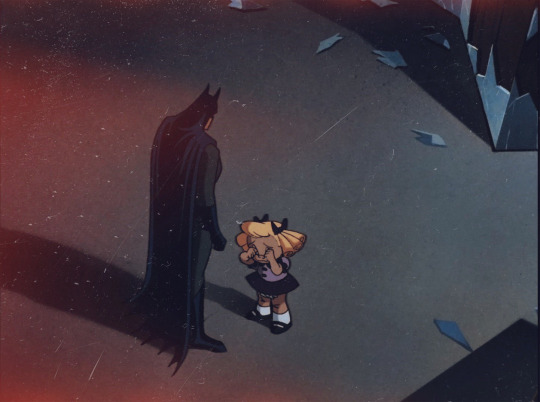
Yes. 100% yes. That’s not even a question for me. I’ve been dying for someone to send me a question like this, because it’s something I’ve noticed in the general fandom response to the pro-heroes and the hero kids. The thing is, the heroes in My Hero Academia don’t really act like good wholesome heroes. They certainly act like marvel movie heroes... in the fact that they have strong superheroes and fight a bad guy and have such a clear delineation between good and evil that many viewers take them to have propagandistic qualities. Like, there’s a reason that marvel movies have degraded to what they are today currently, and besides all the other factors it’s because these comic book heroes are really getting sanded down into a set of superpowers, a costume and a bad guy to beat with no ideals or themes behind their characters. My Hero Academia heroes aren’t really that heroic, they don’t really have any ideals they stand for except the extremely vague notion of defeat the bad guy. Yeah, Deku has “Save people” but Deku is noted several times to be an oddity among heroes.
The Pro-Heroes and the Hero Kids in My Hero Academia have this weird paradox to them where the story itself, and also in world hero propaganda sells the idea that heroes are incredibly wholesome, always selfless, people who go above and beyond to save and protect. Yet, the heroes in MHA are actually extremely cynical, and pragmatic, and they also really have no guiding principals beyond “Might makes Right.”
You can put all heroes on the scale of Spiderman <---------> Punisher.
To define them by whether they are a superhero focused on saving innocents, or a violent vigilante who is focused on punishing the guilty, the heroes in MHA are far more on the punisher scale of things than anyone either in setting or the fandom would like to admit. This is a universe where heroes like Hawks and Lady Nagant regularly commit state sponsored executions. This is a setting where Enji Todoroki is revealed to be a heinous abuser of his family and everyone in the superhero community is like... fine with it for the most part. They either don’t bring it up, or they think Enji does such a good job it justifies his position.
I mean, here to justify my accusation that heroes in MHA are far more on the punisher side of the scale. To compare to another manga, Jujutsu Kaisen and My Hero Academia have a similiar circumstance where a villain, Mahito and Dr. Garaki respectively are able to transform unwilling victims into mindless attack dogs by twisting their bodies into unseemly and horrifying shapes. Mahito’s altered humans, and Dr. Garaki’s nomus respectively seem to retain some sense of humanity and are in a state of pain. Nanami Kento, Shoko and Yuji all come to the harsh reality that there is nothing they can really do for the humans that Mahito has twisted, except for a swift mercy killing, and yet a lot of time is still given to the fact that killing something that is a human being is wrong and a heavy task even though it’s their only option, and two that the decision to kill someone is an extremely heavy burden to bear not made lightly. Nanami straight up loses all focus in a fight, and stops to wipe the tear of a former human when he realizes what they are fighting against.
Compare this to the way every hero responds to the Nomus in My Hero Academia. Enji without knowing whether or not they are truly sentient or even capable of being turned back into what they were, roasts one alive right away it’s his first action with them. Enji then later on meets a Nomu who is capable of intelligence and communication, and roasts it alive even harder specifically because the way the Nomu Acts, reminds Enji of a darker part of himself, and killing that enemy is perfectly satisfying to Enji because it allowed him to take out those personal frustrations. When Mirko learns that the Nomu are former human bsings she has no hesitation at all at bashing their brains in, in fact she’s almost delighted because she doesn’t have to hold back and that makes it easier than fighting regular villains. If the enemy is sufficiently dehumanized than heroes in my Hero Academia very easily resort to murderous methods, and it’s not just heroes like Enji, Mirko does it, heck Present Mic expresses the sentiment that Oboro would be better off dead then continuing his existence as Kurogiri.
The heroes in My Hero Academia are dark, almost myopic. I’m not saying you can’t enjoy them, but they are very different from the way heroes act in western comic books and I think a lot of people don’t know this because a lot of manga fans don’t really pick up comic books, and their biggest experience with western heroes therefore comes from movies.
So when I say BATMAN WOULD NEVER dehumanize a villain to the extent the My Hero Academia heroes do on a regular basis, I’m not saying that as a batman fan, I am saying that because Batman is probably THE MOST IDEALISTIC DC HERO. Yes, even moreso than superman. Batman is Clark’s hero. His inspiration. His good time boy.
Bruce would have noticed there was something off about Tomura right away in the early stages, if not the very first attack he waged on UA. I’m going to use two examples to prove my argument, one the fact that heroes also noticed that Shigaraki was extremely mentally unwell and just decided not to really care about it, and two Batman was actually faced with an extremely similiar situation in BTAS and his reaction is pretty much the opposite of All Might’s.
1. There’s Something Wrong with That Kid
To those who were paying attention to Shigaraki’s character from the beginning, even before we got to dig further into his backstory in My Villain Academia arc, or even be shown a more sympathetic and human side to his personality in the Overhaul arc, from his introduction Shigaraki shows signs of extreme mental distress. He is constantly exocriating himself, which is a form of self-harm that manifests under circustmances of extreme psychological stress. Shigaraki has a full on skin disorder that many people have because he is so poor at managing his stress he relentlessly picks and scratches at himself.
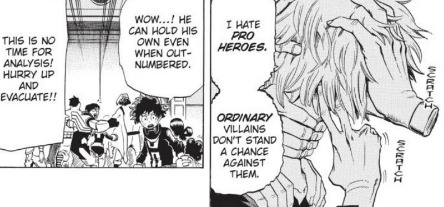
When he starts to lose in the middle of the fight, he essentially throws a tantrum, and not only does he immediately want to give up and go home, but he also lashes out at his own ally to try to vent that anger.

When All Might removes the hand from his face he has a momentary break from reality, and talks to the hand a physical object like it’s a person calling it “father” and apologizing to it.

Shigaraki also shows a clear grudge against both heroes, the failure of heroes, and the violence that heroes show (no kidding he’s a victim of violent abuse and the cycle of abuse in his family has an origin in his grandmother’s complete and total failure as a mother) that he clearly states in front of All Might once, and then Deku later the idea that heroes do not save people with their violence, and the implication that there are people that All Might have not saved and both times he is essentially brushed off by both of them.

Shigaraki’s mental distress is so obvious that even the heroes of My Hero Academia, who’s general response to villains is lock them up and throw away the key, noticed it. The heroes notice several of the symptoms I listed above about Shigaraki, but then decide to dismiss him as a man-child and then go on to say that he represents a kind of “pure evil” that villains may find attractive. The enertain the idea for like half a second that there might be more to Shigaraki that makes him different from the regular street villains heroes usually fight, and then they just dismiss the thought. Once again a common theme, the second All Might realizes he is Nana’s grandson he wants to go after Shigaraki to attempt to find him and reason with him only for once again Gran Torino to dismiss him as the kind of villain who’s beyond redemption and All Might to immediately give up on trying any other tactic than beating him down.

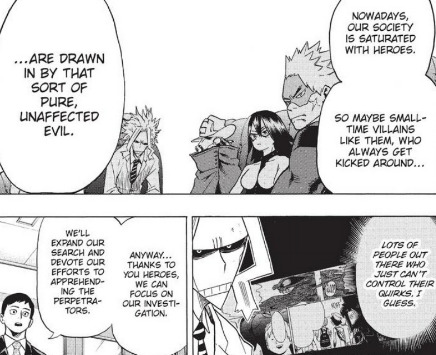
Now why do I say Batman would have immediately gone after Shigaraki and tried to reason with him and get him the help he needs? Do I have proof of him acting similarly? Batman in fact, comes across a similiar enough situation in one of the most famous episodes of Batman the Animated Series.
2. Man-Child meet Woman Child

Baby-Doll Batman the Animated Series season 3, episode 4 is one of the most popular episodes, and it shows most clearly the way Bruce’s brand of heroics is ultimately based on saving and empathy for his villains rather than just putting them down for the greater good. I could have gone with a lot of batman villains with much more clear and tragic origins, Mr. Freeze isn’t even trying to achieve anything villainous he wants to save his wife. Two-Face started out as not only Batman’s best friend, but a good guy and an ally of justice who was driven to insanity by a horrifying and sudden tragedy. Harley Quinn is a victim of grooming and abuse similiar to Shigaraki who has her entire sense of self warped and controlled by an abusive narcissist who quite literally turns her into a crude relfection of himself, to act as a pawn in his own evil schemes. I could use a lot of batman villains, but no Baby Doll, we’re going with Baby-Doll.
Mary Dahl is a washed up child actress with a physical condition that prevents her from growing up past a child, she’s sort of like Claudia from Interview with a Vampire, an adult mind inside a child’s body. Not only will she always be treated and regarded as a child for her physical appearance, due to her child as a former child star who’s show was cancelled and had no success in acting when she tried to do anything outside of playing the cutsey and innocent “baby-doll” on the sitcom “Love that Baby” she has ended up emotionally stunted and stuck in the past.
Mary Dahl’s fall to villainry is a bit less tragic than Shigaraki’s, she wasn’t like kidnapped and groomed since childhood by a villainous mastermind and turned into his own pet “make your own supervillain” project. She’s not getting work, but she’s not poor or destitute, there are former child stars who lose out on their childhoods and have no money to show for it, but she seems to have enough money to at least have an extremely competent agent and money to blow on her elaborate schemes. Her backstory is not nearly as tragic as Shigaraki’s, yet she shows several symptoms in common with Shigaraki, being a former child star like many child stars she shows severe dysfunction as an adult because it ate up her entire childhood. Child labor is bad people. Children who are not given room to grow up and develop as kids, have problems late into their adulthood.
She is also someone who feels rejected and left behind by society as a whole, it’s clear her only way of connecting to other people was the attention she received as a child star and the connections she had with cast members. She also experiences severe body dysmorphia I would say on level with Shigaraki’s, Shigaraki’s body dysmporphia is so bad he constantly picks at his own skin, his quirk soemtimes even causes physical damage to him and he feels extreme nausea at a near constant basis b/c of his emotional unrest. Baby-Doll literally experiences a same incompatability with her body, she has an adult mind, she craves to be a fully grown normal body, and a lot of her mental breaks from reality seem to come from how easily people mistake her for and treat her like a child.
Mary Dahl also shows severe dysfunction when it comes to regulating her own emotions. As tragic as Mary Dahl’s fall from fame is, and as much as it mirrors what happens to a lot of child stars in reality, Mary Dahl kind of also dug her own grave by her actions. Everyone on the cast thought she was notoriously difficult to work with, her show wasn’t cancelled on her, she left because the directors added in a new character she didn’t like and took attention away from her because of plummeting ratings. She left the show to try to take a more serious turn as an actor, once again to get attention and because she was on an ego-trip, then tried to get the show running again when it didn’t work for her but by that point it was too late. She’s also someone who just does not treat people well, she’s manipulative, she never engages people as her true self Baby-Doll is a role she is essentially playing, to both allow herself to violently lash out, but also to evade any responsibility for her own actions. It’s also ambiguous how much of the Baby-Doll persona is a genuine psychotic break (I don’t use the word psychotic lightly, I’m also not saying LOL look at her she’s so crazy, but there are genuine moments where Mary seems to mistake what happened on her TV show for reality which indicates that she’s not just trying to reclaim her former glory, that she is full on having delusions) there are also moments where “Baby-Doll” is a deliberate act she’s putting on, and Mary seems aware of what she is doing.
Mary Dahl is at the same time, delusional enough to believe she can kidnap everyone on her former show, and force them to just pretend to be the characters they were on her show, and playing dollhouse with this pretend family will somehow fix her problems. She is also, lucid enough to carefully plot and execute the kidnapping of several people, control a minion in her agent, and then evade capture from Batman several times. She is both a victim (she’s genuinely mentally unwell) and a villain (but not unwell enough she’s not aware her actions are wrong, she’s deliberately hurting people she just thinks her tragedy makes her entitled to that revenge). Mary Dahl thinks the world has wronged her and left her behind, that her show being cancelled was some great injustice done to her, and something she deserves the chance to rectify, even though as I just explained in detail that Mary was equally as responsible for the cancellation of her show. She is a person not willing to take any responsibility for her actions or see fault in herself.
You could even argue because of these quality Mary is way less sympathetic than Shigaraki, Shigaraki at least seems to have genuine critques about his society, and feels that he and the people around him have been rejected in an unjust fashion. Mary Dahl is upset her TV Show got cancelled and decided to make it everyone else’s problem. Mary Dahl’s problems are a lot more selfish, and smaller in comparison to Shigaraki’s, and yet the story itself does not downplay Mary’s distress because it is genuine to her.
In one extent, Mary is a danger to others, but she’s also a danger to heserlf. Like I said, it’s ambiguous how much but she’s clearly a mentally unwell woman. When someone is experiencing delusions on that level it’s a brain chemistry problem, and it’s also not something where it’s fair to go “Well, she has no reason to be mentally ill, it’s not like she was beaten, she’s just having an emotional breakdown because she’s not famous anymore.” I mean, what does it matter the reason whether she’s having a breakdown is a good enough reason or not, she’s clearly in extreme distress.
Number two, I think society as a whole tends to downplay the suffering of celebrities or child stars and make them seem like they are just entitled or spoiled for acting out, because they’re rich and famous and living a life most people would die for so who cares. But, HollyWood, the spotlight, and public scrutiny has a really bad psychological effect on people. Most people would not do well under such harsh public scrutiny all the time, and also when you make your entire personality around being a star and having the spotlight, also because in Baby Doll’s case there’s really no other career avaiable for her because of her condition then losing that is a pretty huge loss. Like, child stars who cannot either adapt to adulthood, cannot get work as adult actors, or just cannot even function as adults is a pretty common societal problem.
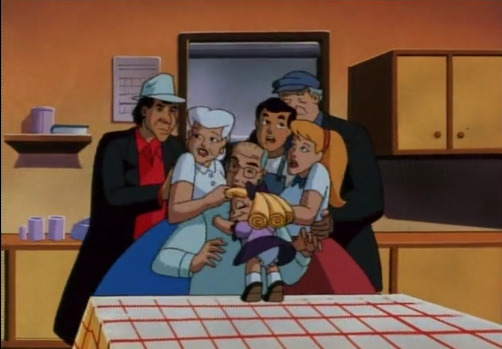
On top of kidnapping people, holding them hostage, she’s also someone who clearly needs help, like Baby-Doll is not just doing these things because she’s a selfish, entitled brat throwing a tantrum because she’s not famous anymore, she’s experiencing clear mental breaks from reality where she confuses her tv show for reality, she’s mentally sick and in need of treatment.
Baby-Doll is presented to us as a manipulative child star desperate for the spot light, endangering her cast because she herself cannot let go of the past for most of the episode, people around Bruce are pretty unsymapthetic to her, her attempts to get a more serious career is played off as a joke, the cast members do not like Baby-Doll and found her to be extremely high maintennance and difficult to work with even when she was on the show, Baby-Doll’s clearly not after the cast because of nostlagia, friendship or happy memories she has with her former cast members, but rather because she wants to pretend to be the the sitcom character who was surrounded by family who loved her. People constantly remark how crazy she is for thinking a tv show is reality. Even Robin says that he absolutely despised the “Baby-Doll” show, and it’s dismissed as kind of a cheesy sitcom with no real merit.
However, the last five minutes turn all of that on its head. Bruce Wayne, my darling, is presented to us as a man of few words. We don’t actually see Bruce’s reaction to what Baby-Doll is doing for most of the episode, we see Dick’s who clearly thinks she’s just crazy, Bruce the whole time is focused on just resolving the incident first, finding the kidnapped people, rescuing them from Baby-Doll’s grip. So Bruce’s absolute first priority is just to stop the villain from doing the bad thing, he stops the bad behavior and makes Baby-Doll unable to hurt others.
Bruce, the living embodiment of the term “Gap Moe”, because he is so closed off and not reacting to Baby Doll in any way, does not seem to be going out of his way to sympathize with her. That however, changes once the the threat Baby-Doll represents to others is neutralized. Baby-Doll then flees from Bruce with a Tommy Gun out into the middle of the night. The tables have turned and Baby-Doll has gone from a cackling villain, pretending often to be a scared little girl in order to manipulate people, to a genuinely scared and desperate person. Even the image Baby-Doll evokes fleeing from Bruce, is a sympathetic one, Baby-Doll despite being an adult woman still looks like a child, and acts several times like a woman-Child and she is fleeing from an adult man who picked his costume to terrify crimminals into submission.
Baby-Doll flees into a carnival ground filled with children, she has a Tommy-Gun on her, she’s still pretty much a direct threat to others, but the way Bruce approaches her does a complete 180. Bruce is calling out after her to stop fleeing, when she disappears into a tunnel, he’s telling her to stop not because he wants to arrest her, but because she’s going to hurt herself at this point. Baby-Doll is no longer a danger to others, she’s a danger to herself because she’s scared desperate, and fleeing, and instead of pursuing her to put her down Bruce is trying to stop her from getting hurt as she flees. This is also behavior he has shown to repeat, in Harley’s Holiday he pursues Harley the whole episode not to stop her because she’s on a crime spree, but because she’s freaking out and he doesn’t want her to be sent to Arkham and lose all the progress she made in her recovery.
Bruce pursues her into a mirror maze and this is where we get the most famous scene in the episode, Baby-Doll is still dead set on killing Bruce (this is also where Bruce shines, Baby-Doll is actively firing a gun at him and he is still calling out at her to stop because she might get hurt).
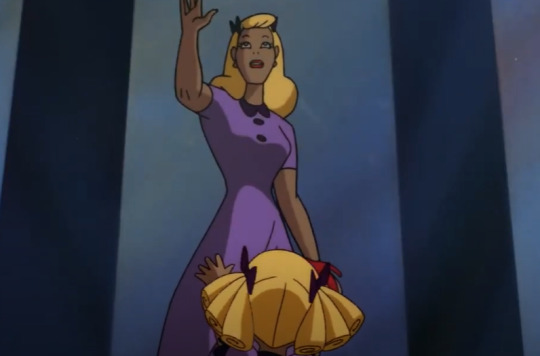
Baby Doll fires at the mirrors over and over again, until one of the funhouse mirrors shows her what she might look like as an adult, at which point not only does Baby-Doll come to a complete stop, but she talks not in her Baby Doll voice, but as Mary-Dahl.
Mary Dahl: Look. That’s me in there. The real me.
Mary Dahl: There I am... BUt it’s not really real, is it?
Mary Dahl: Just made up and pretend like my family, and my life and everything else.
Mary Dahl: Why couldn’t you just let me Make believe?
She then grows angry at realizing that she is trapped on the other side of the mirror and will never exist in that adult body, she starts firing at every mirror around her trying to get batman who stalks her once again as an unspeaking shadow, until she gets impatient enough to destroy even the idealized image of herself represented in the funhouse mirror. At which point the gun itself runs out of ammo, and Mary breaks downc rying. At that point Batman could say that Mary is just throwing a tantrum, that being a washed up child star doesn’t entitle her to hurt others, he could say that her tears aren’t even real because Mary Dahl has pretended to be a child in order to manipulate other people and merit sympathy literally this whole episode. Bruce does not do any of that. Bruce’s only action after following her this whole time, is to remove the gun from her hands so she’s no longer capable of hurting someone, and then when she hugs him, to return her hug and comfort her.
Mary Dahl: I didn’t mean to...
Because, utlimately she’s a human being who needs help. It’s not Bruce’s job to pick and choose who deserves that help, it’s his job to help people who need it.
So yes, Bruce would have noticed right away that Shigarki wasn’t just a violent child, but a child who is clearly suffering from distress and lashing out. He wouldn’t just dismiss Shigaraki as an entitled man-child because as I’ve just demosntrated, Bruce had a situation where he frankly could have just dismissed Baby-Doll as a selfish an entitled vain womanchild and yet he didn’t do that. He saw a crying person in front of him, and he helped them, and he was even trying to help her before she started crying and asking for comfort like a more standard victim TM. Letting a child who shows clear signs of abuse like Shigaraki has go unhelped is not only out of character for Bruce, it basically is against everything he stands for as a hero.
And if you still don’t believe me on that, here’s a quote from the director of the final installment of the popular Arkham Series, “Arkham Knight”, a game that features a character Jason Todd who was similiarly groomed over a long period of time by batman’s arch enemy into an enemy for batman to fight.

#askspookies#batman#dc meta#dc comics#dc comics meta#batman meta#bruce wayne#btas#batman the animated series#shigaraki tomura#mha meta#metasks#ironically this long post is not bashing MHA for having dark heroes#as much as i love idealistic heroes my second favorite marvel hero after spiderman is daredevil#my third favorite is the punisher#though versions of the punisher that are aware#that he's not doing the right thing#the line between heroics as essentially volunteer work#and heroics as vigilanteism#is a fascinating concept to explore#jason todd is much more interesting as a violent drug lord who is still soft on victims#then he is as a much more sympathetic and palatable edgy anti hero with daddy issues#its just the extreme dissonance in mha in how the heroes are written#and how they are framed#my biggest example is hawks of course#hawks goes to extremely dark territory that makes for a fascinating character#only for hori to completely back off on that plot#and go back to framing hawks as an idealistic hero obsessed with saving people#that's just a clear example of having your cake and eating it too
260 notes
·
View notes
Text
What is the point of a hero?
Anticlimax in Chainsaw Man Part 2
Part 2 is garnering more and more criticism as it extends its excruciating middle portion towards the inevitable collapse. There are talks of Fujimoto losing the plot, skipping over important details, the story not making sense, Asa being flattened into a supporting character for Denji, and more.
To my mind, these criticisms center on the same thing: anticlimax.
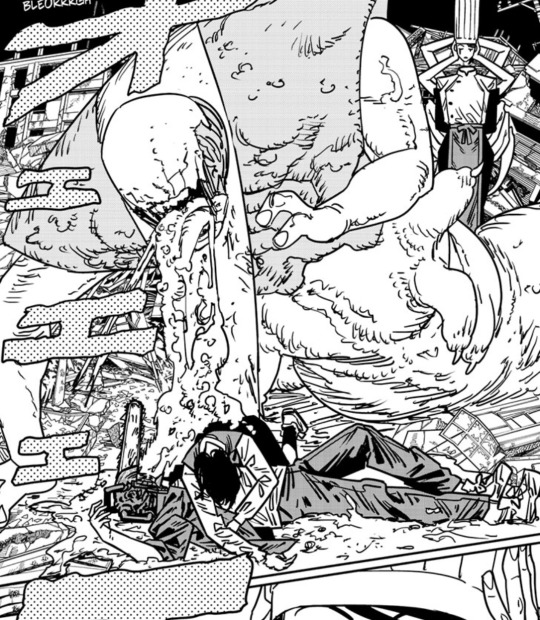
The Falling Arc ends with the first major anticlimax of the entire Chainsaw Man series. That moment turned out to be a sendoff of many aspects of the series which had defined its identity in part one: the breakneck pacing, the grotesque monsters, the ultraviolence, the detailed rendering, and most significantly, the cycles of catharsis.
Part One was a face up rendition of the heroes journey: the cathartic cycle. This cycle was paralleled with the hedonistic cycle of consumerism. From the very origins of the series, Fujimoto was critiquing the heroic narrative by exploring a different perspective on the hero’s existence. In the lineage of Devil Man, Evangelion, Utena, etc. Fujimoto considers the harm that heroism does to the hero.
However, in part one, we don’t understand this dynamic until the final arcs of the series. The hero’s journey is played mostly straight, with exciting adventures, a lovable cast, a host of creepy monsters, despicable villains, cosmic fantasy. On the surface, this is normal Shonen Jump. The walls are closing in behind the scenes.
This is the mechanic behind the Makima turn. It is a reveal, but not a twist. We are well aware that Makima is not human, is suspicious, and has some malicious intent surrounding Denji. The reveal is what those intentions are, and what makes it so compelling is the nature of her intentions.
We learn that all the events of this story — the job, the romance, the organization, the friends, the family, the adventure — were being manipulated with the express purpose of destroying Denji. His cycle of catharsis was always leading him to his doom. It was made to destroy him. His tragic flaw is ignorance: he didn’t stop to think about what was going on.
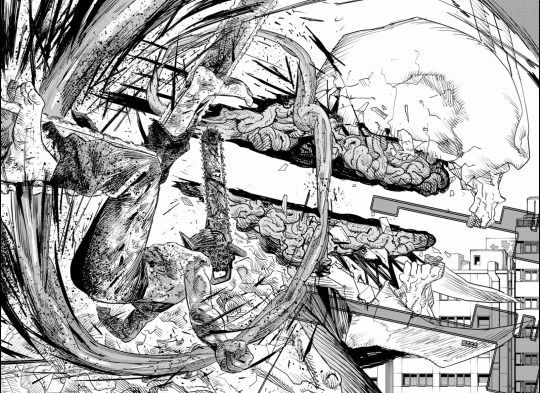
Part 2 picks up on Denji in this same state. He is still chasing the cycle. He goes out, defeats the monster, everyone praises him. It’s great. However, we see the same lingering signs that something is off. The people he abandons in his fight against Cockroach. Corrupt government institutions using him as a popular spectacle.
But in the first Asa-focused section of the story, we the readers are also locked into the cycle. Asa follows the same journey — literally the same, from bat devil, to the eternity devil, to a final climactic battle where she faces her childhood trauma and arises an actualized hero. Or did she?
Because that isn’t what happened to Denji. The cycle of catharsis was not a journey of self discovery; it was a trap. A distraction. A cover for the underlying intentions of the state as embodied by Makima. Even the idea of Chainsaw Man as a hero was a part of the plot to destroy Denji’s life.
But with Asa, as we approach the apex of her story, right as she has asked Chainsaw Man to save her, and she herself is using her own powers to save him as well, overcoming her fear of the other to risk her own life, plummeting towards certain doom! How will they escape!
They don’t. They get eaten. And somehow Nayuta is there and she just saved them. ??????????????????????????????????????????
It’s like their powers didn’t even matter! What about all that character development? They just lose? And then it doesn’t even matter that they lost? Then what was the point?
What is the point of a hero?
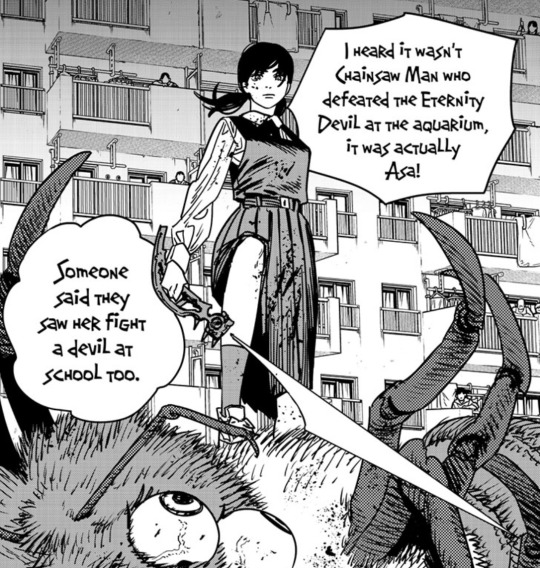
Asa’s introduction ends with the series’s first anticlimax, but that will not be the last. In fact, it is only the beginning. Because for the rest of the series, it will be constant. Every single tension will be diffused. Every single horror will be dodged. Every build will break.
Let’s go down the list:
Denji is forbidden from being Chainsaw Man, and his identity is stolen. He isn’t Chainsaw Man anymore.
Denji thinks about rejecting Fumiko’s advances, but can’t.
It appears Fumiko and Denji will fight, but then they don’t.
Asa becomes a minor celebrity and cult figurehead, but we never see any of it.
It seems like Miri will be Denji’s friend, but he’s an insane cultist.
It seems like Miri and the other hybrids will go on a spree, but Quanxi stops them.
It seems like Denji, Nayuta, and Fumiko will have to fight a mob of monsters, but Quanxi saves them.
It seems like Yoru will fight Yoshida, but he runs away.
Denji fights and defeats the hybrids, but is attacked and captured by a random mob.
Nayuta is in danger, but we cut away.
Denji gets chopped into pieces, and is quickly put back together.
Quanxi appears again, defeats everyone, but immediately surrenders.
Asa’s time as a hero is explained away as a passing fad.
As a reader, I can’t lie, it is annoying. And aggravating. And it is so blatantly intentional that it pisses you off. Fujimoto is refusing to give catharsis. Even the climactic moment of Denji’s arc — facing down Barem in front of his burning home — is not catharsis. It is torture. More building trauma and tension. Never any satisfaction.
Basically, he’s narratively edging his audience. And face up telling you that this is what is going on too. He even does it as a gag during Fumiko’s introduction. He gives a little peek at the catharsis that he knows we all want to see, but he won’t do it. He can do it — he was doing it all through Asa’s development — but he is deciding not to, and showing you that he’s deciding. He’s playing with his cards face up, but folding every hand.
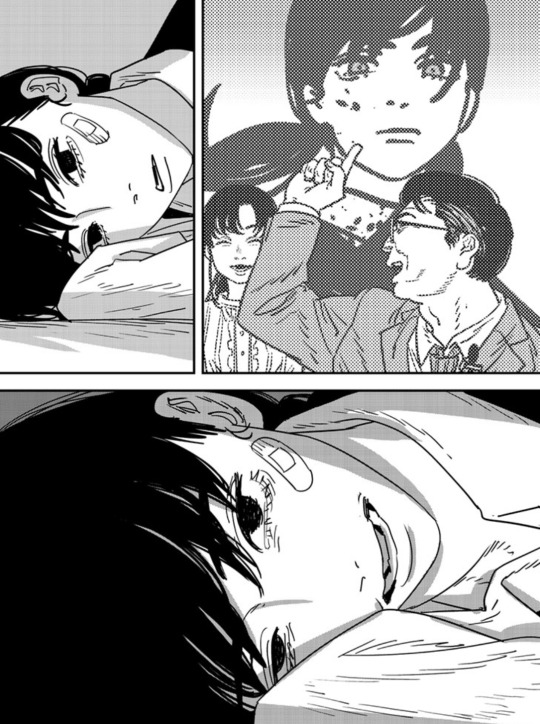
Asa’s celebrity being totally sidelined is by far the most controversial of these instances. Her introduction fully engages us in her hero’s journey — a true hero’s journey. She isn’t a hedonist like Denji; she has ideals. She is fighting to save people. She actualizes. She becomes a real hero of the city.
But we don’t see it. Instead, we leave her story and look at Denji, who explicitly can’t be a hero. And through Denji’s story, we see the other side. Asa’s heroism is Denji’s downfall. She is getting everything that he was after. We understand what Asa has by what Denji lacks.
Asa’s catharsis is hidden. Or rather, her heroic catharsis is hidden. We got to see her journey to becoming a hero — to taking Chainsaw Man’s place — but not what happens when she is living that life. The same kind of life Denji lived under Makima.
Denji had Makima rooting for Pochita, manipulating and deceiving him. Asa has Fami rooting for Yoru, manipulating and deceiving her. Makima made Denji a hero to manipulate the public. Fami made Asa a hero to manipulate the public.
So in some sense, there’s no need to show it because we’ve seen it all before. But you still could. And it would be fun. Everyone would like it. It’s fine to, right?
Right?
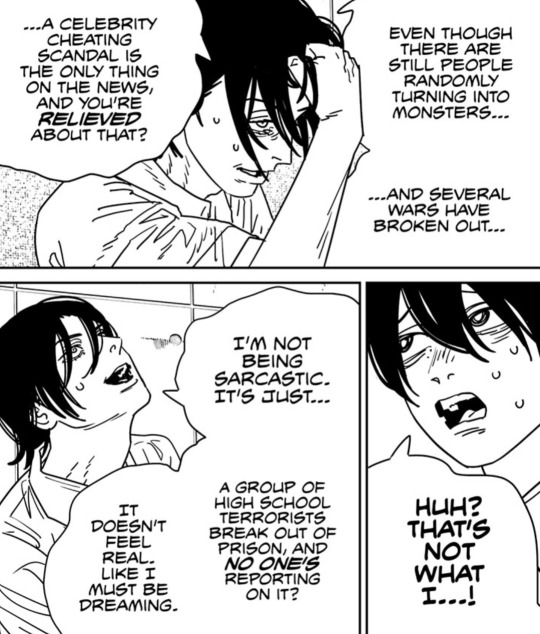
Running parallel to the anticlimax is a long winded critique of popular culture. Particularly fandom culture. That is to say, hero worship.
The members of the Church worship Chainsaw Man because he saved them. The media uses Chainsaw Man and Asa as distractions from the horrors of life under threat of devils. Fans of a certain idol are driven to stress and conspiracy by a scandal. Meanwhile, wars are breaking out, government facilities are being invaded, people are turning into monsters.
Their love of Chainsaw Man turns them into monsters.
Barem and Fumiko are a notable skewering of the real-world Chainsaw Man fanbase. Fujimoto roots his critique of hero stories in a critique of his own hero story. While it is a reckoning for his fans, it is more so a reckoning for himself and the impact that his story had on the world. What was the point of what he did? What did it accomplish?
As of writing, the story isn’t finished, so the ideas aren’t complete, but at least at this point (chapter 164) it doesn’t look good. We see Fumiko is lost in her sexual obsession, abusing her target. We see Barem is completely insane, overwhelmed by a glorification of violence. We see a vast mass of fans whose obsession is harnessed to turn them into mindless killers.
You cannot help but think about the Chainsaw Man fandom in the wake of the anime. Harrassing the series director, constant asinine opinions all over the internet, the discourse around MAPPA — not around Chainsaw Man at all. Egregiously horny art. Legitimately disturbing sexualization. Popular response focused on the action and violence, not on the meaning of the story.
Is this what he wanted? Is this what heroes inspire? Is this what happens when you give people catharsis?
Is this what heroes are?
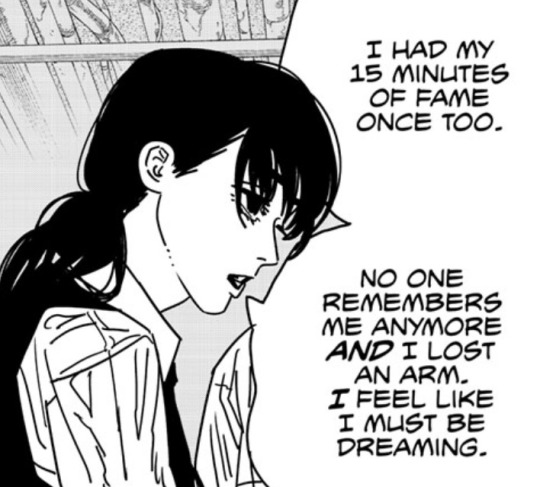
So, for Asa, he doesn’t do it. He won’t do it. He won’t create a cycle of catharsis. He won’t make a heroic tragedy. Instead, he will divert, avoid, hide, pause, deny. When she follows the path, we look away. When we want the hero, we get nothing instead.
Fame — heroism — isn’t a triumph. It’s a flash in the pan. An illusion. A tool of distraction. A vector of misogyny — society. A corruption of the self. For the hero and the fans.
Denji’s long arc is the positive exploration of the negative space Asa’s story leaves. Look away from the hero at hand and look at the hero that was. Look at what it did to him, what it does to him. Think about what this story does to you. Think about what it does to the world.
We are done with the spectacle. We’ve left catharsis behind. We’re living beyond the high. So, what is there? What can there be? What other story can you tell? How do we relate, exist, outside of saved and savior? If the hero is a lie, who will save the world? Can the world be saved?
We’ll have to find out.
22 notes
·
View notes
Text
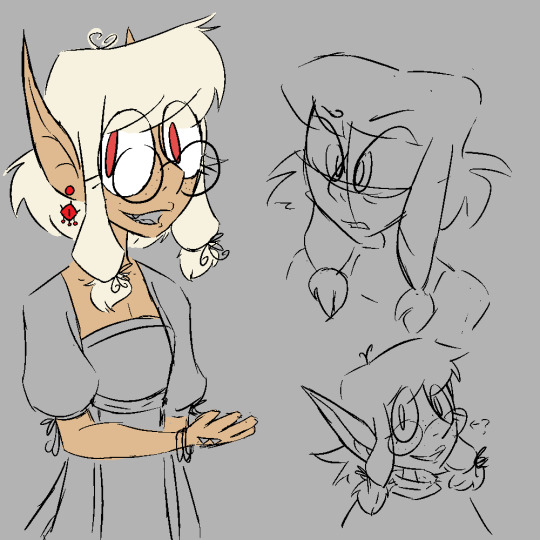
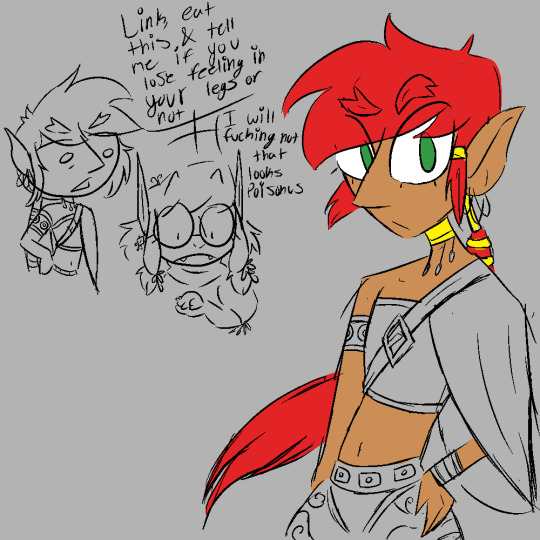
I wanna make a like fan point in the timeline for Zelda where everything is fucking wack as hell cause I like to make things harder for the protagonist than it needs to be
Current concepts I have under the cut
-Hyrule currently has three royal princesses but they do have a forth half sister. The eldest of the four is named Zelda because everyone believed that she would take up the position as the goddess blood as Zeldas have before her in her ancestry. Zelda is trained and raised with a LOT of responsibilities on her shoulders including being the eldest sister who has to take care of the other three in some ways. However, come to find out she isn’t the chosen ancestor. Oops. Instead it’s the youngest and half sister (pictured on the left but currently unnamed) who is half sheikah and honestly didn’t even think she counted as a princess and spends most her days in the library or out in the forests
-Link (pictured on the right) in this timeline is born as a gerudo who grows up and declares himself as a man (trans) and because of the legend of the male gerudos becoming their king they take this as the sign that Link is the next gerudo king. Unfortunately he wants nothing to do with any of that kind of responsibility so he runs away from the village. Only to stumble on the master sword and meet Fi who, in turn, explains that he’s the hero spirit which, he also really really does not want and by running away from responsibility is only thrusted with more expected of him
-I had a few concepts for the new incarnation of the triforce of power. I was thinking of him being either a Rito or Zora who is haunted by the spirit of Ganon who threatens to take his body near constantly. Unfortunately at the start of our story Ganon’s spirit is only strong enough to possess a korok. However, he does state that if (currently unnamed character) is to ever give into the triforce or the curse of the Demise that Ganon will be able to take over completely. Whether this is true or not is up for serious debate. Either way it puts him on constant edge especially around Wisdom when he learns she has the goddess blood in her
-Other little ideas I had was that Link is almost a Robin Hood type during his solo travels. Fi is both happy he has a heroic air to him but also do you have to cause this much trouble everywhere you go?
-Wisdom and Power are friends growing up as Power is a royal guard for whatever species he is and has met Wisdom countless times during visits to Hyrule
-A part of me also was thinking of Power being half gerudo and is actually the rightful gerudo king, not Link but because he wasn’t raised in their village no one knows
-I was thinking of Link having a broken piece of the triforce of courage stuck in his body. Another part of the reason why Fi is like hey man I know you hate this responsibility shit but you literally can not ignore me here
-Power possibly coming to the concept of stealing all the pieces of the triforce not to use them but to destroy them, thus pushing him over that unfortunate edge of being against Link and Wisdom
#legend of zelda#loz#princess zelda#zelda#link#loz link#I probably should name this au thingy#art#fan art#toonz art#do these count as ocs?#toonz ocs#original character#original characters#ocs#im just spit balling tbh
19 notes
·
View notes